
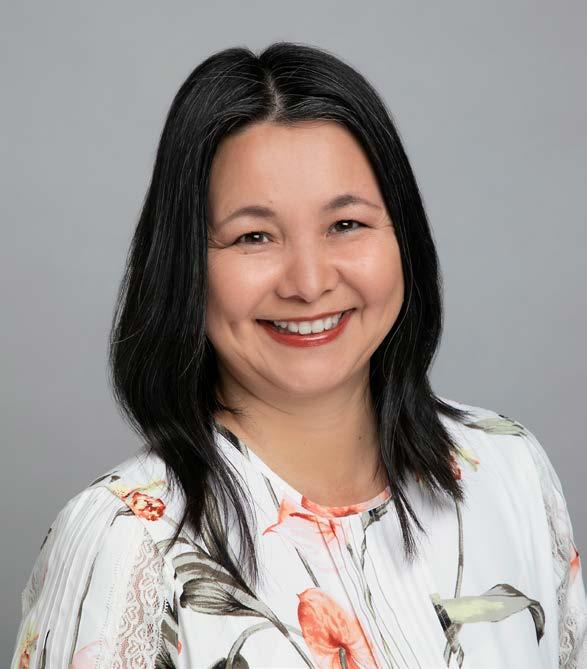



Greetings,
Western Governors University was established by states for states, and our mission remains focused on expanding access to affordable, high-quality educational and training programs while contributing to a thriving workforce. This latest edition of The State of WGU magazine highlights our growing impact on students, families, and local communities—and showcases what we can achieve with the leadership of policymakers like you.
In our 28-year history, WGU has played a significant role in reaching nationwide benchmarks in degree and certificate attainment, assisting states in meeting workforce demands, and fostering a more equitable society. Through innovative programs and partnerships, we continue to offer flexible pathways for individuals to achieve their goals.
Ensuring that the communities we serve remain vibrant places to live, work, and raise families requires collaboration, and your support is essential. Together, we can drive innovation, expand access to education, and align learning opportunities with the demands of a rapidly changing economy. Thank you for your commitment to education and for helping to create paths forward for others.
With gratitude and respect,

Tonya M. Drake, Ph.D. Regional Vice President Northwest Region


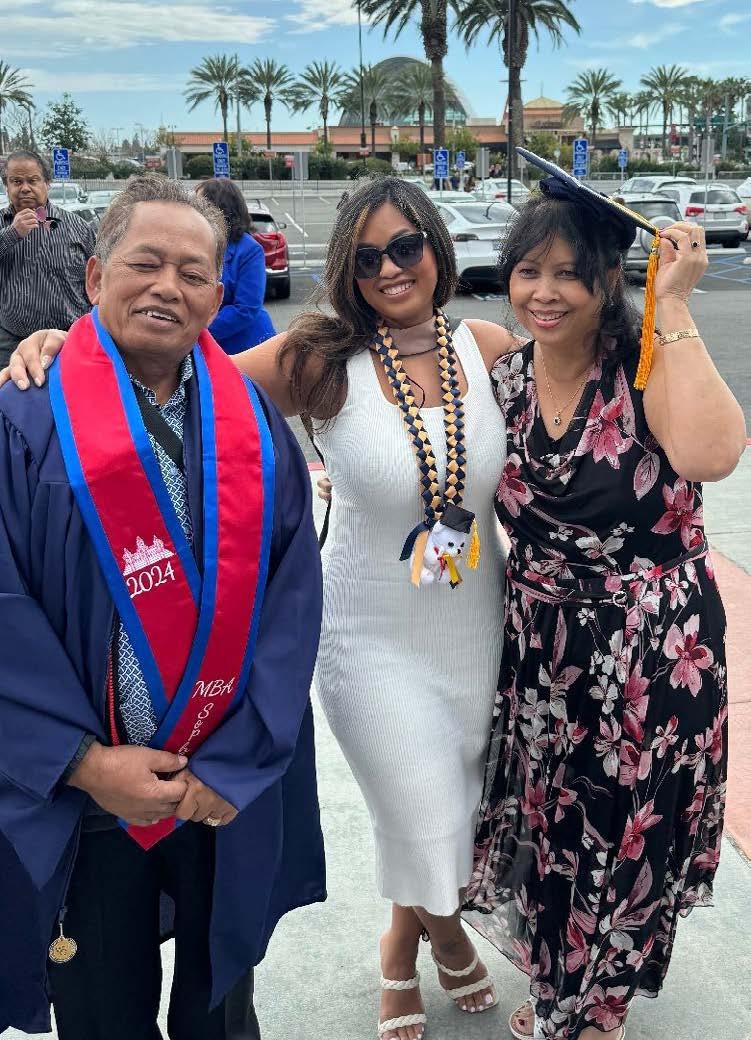
"My parents, my heroes! They migrated to the U.S in October 1983 from their war-torn country of Cambodia with nothing but the clothes on their back, a few pieces of paper, and a crying two-month old. They tell me all the time of how proud they are of me, but really I am so proud of them! Proud of their resilience, proud of their determination, and proud that they are my parents. By the look on their faces, I think they enjoyed this moment as much as I did! Thank you, Mom and Dad. We did it!"
Join Chris Bonnell on the Sage Advice podcast as he talks to industry experts across the country, and find out how WGU is revolutionizing higher education by making student success and well-being the core of its mission.


Welcome to The State of WGU. As Vice President of State Government Relations at WGU, I want to express my heartfelt thanks for taking the time to learn about our institution.
These pages offer a closer look at the profound impact WGU is making on our students. Their personal transformations not only enrich their own lives but elevate their families, communities, and professions.
In this issue, we are excited to highlight the innovative work of WGU’s four distinguished schools: Leavitt School of Health, School of Education, School of Business, and School of Technology. These schools are trailblazers, reshaping the higher education landscape so students can acquire the latest skills and credentials that are relevant to their industries. Together, the schools are renewing the American workforce—one graduate at a time.
Who better to showcase the outcomes of a WGU education than our graduates themselves? To that end, we celebrate the achievements of four exceptional graduates: Andrew Nydegger, Amber Donat, David Statum, and Aspen De La Cruz. Their stories exemplify the powerful impact of a degree from WGU.
I am deeply honored to support WGU’s mission to change lives for the better. Please contact me directly if we can be of assistance to you and your state.
With sincere appreciation,

Chris M. Bonnell Vice President, State Government Relations

WGU’s Michael O. Leavitt School of Health offers an innovative approach to healthcare education that is specifically designed to meet workforce needs.
193,100
17,740 Annual Job Openings DEMAND SUPPLY
New Nurses Annually
WGU’s Michael O. Leavitt School of Health (LSH) was named in honor of former Utah governor and United States Secretary of Health and Human Services Michael O. Leavitt, who was a major proponent of competency-based education. LSH was established in 2006 with the mission to make a difference in the fields of healthcare and nursing by providing the education that medical professionals need to succeed. Through its dynamic curriculum, generous scholarships, and diverse program offerings, LSH aims to be a valuable partner in addressing healthcare workforce shortages across the country.
The need for nurses has never been more dire. On average, there are only nine registered nurses (RNs) per 1,000 people living in the United States. The U.S. Chamber of Commerce projects 193,100 job openings for RNs every year, but only 177,400 total nurses are projected to enter the workforce until 2032.1 This means that 42 out of 50 states could experience nursing shortages by 2030.
Healthcare workforce shortages can have lasting results. Hospitals and clinics that are inadequately staffed experience increased medical errors, stress, and employee burnout. More seriously, nursing shortages can result in higher morbidity and mortality rates.
These workforce challenges also mean that nursing is a stable and trusted
profession. Not only has nursing been ranked as the most trusted profession for 22 years in a row,² but 99% of individuals with nursing expertise are able to secure a job when they are actively seeking employment.
Since 2009, WGU has educated more than 100,000 graduates and conferred over 118,000 degrees from the Leavitt School of Health. In 2021, WGU produced 17% of the nation’s registered nurses who earned their Bachelor of Science in Nursing.³ And the following year, WGU conferred 5.4% of all bachelor’s and master’s degrees in nursing across the country. Across the U.S., 2% of all registered nurses with an active license are WGU nursing graduates. That’s because healthcare providers trust WGU. The baccalaureate degree program in nursing, master’s degree
¹ https://www.uschamber.com/workforce/nursing-workforce-data-center-a-national-nursing-crisis
² https://nurse.org/articles/nursing-ranked-most-honest-profession/
³ https://www.utahfoundation.org/news/wgu-leads-nation-in-nursing-graduates
4 https://www.aacnnursing.org/news-data/fact-sheets/nursing-shortage
program in nursing, and post-graduate APRN certificate program at WGU are accredited by the Commission on Collegiate Nursing Education.
The Leavitt School of Health is part of the 1% of nursing programs to have been designated as a Center of Excellence in Nursing Education by the National League for Nursing. This designation is well earned. Patient safety is enhanced when nurses have a baccalaureate degree,4 and LSH ensures that graduates have the most up-to-date knowledge of healthcare practices. Most recently, LSH redesigned its RN to BSN degree program to include professional development certificates that respond to employer demands.
The Leavitt School of Health offers more than nursing programs, though. Most recently, WGU launched undergrad healthcare programs in health science, psychology, and public health. Each of these programs were created in response to specific workforce needs.
To become a nurse, most individuals have to leave their careers to pursue their education. At WGU, they don’t have to. The Leavitt School of Health meets students where they are by providing a path to pursue a healthcare career that might not otherwise fit into their demanding schedule. By training students from rural areas and providing opportunities for local clinical placements, LSH helps build a healthcare workforce that is more likely to remain and serve in their communities post-graduation.
To learn more about the Leavitt School of Health, visit wgu.edu/health.
BACHELOR’S PROGRAMS
Nursing (RN to BSN online)
Nursing (Prelicensure)
Health Information
Management
Health and Human Services
Psychology
Health Science
Public Health
CERTIFICATES
Nursing Leadership
Nursing Education
Nursing Leadership and Management
Family Nurse Practitioner
Psychiatric Mental Health
Nurse Practitioner
MASTER’S PROGRAMS
Nursing–Education (BSN to MSN Program)
Nursing–Leadership and Management (BSN to MSN Program)
Nursing–Nursing Informatics (BSN to MSN Program)
Nursing–Family Nurse Practitioner (BSN to MSN Program)
Nursing–Psychiatric Mental Health Nurse Practitioner (BSN to MSN Program)
Nursing–Education (RN to MSN Program)
Nursing–Leadership and Management (RN to MSN Program)
Nursing–Nursing Informatics (RN to MSN Program)
Master of Healthcare Administration
Master of Public Health
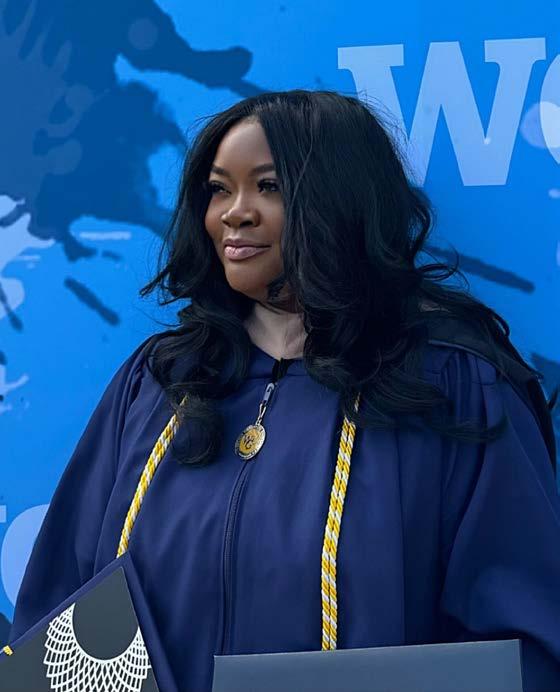
“The flexibility of WGU’s online programs allowed me to pursue higher education while balancing a full-time job, caring for my family, and managing other responsibilities. This unique model provided an environment where I could thrive without compromising my personal commitments. My BSN and MBA from WGU opened doors to opportunities I once only dreamed of.”
Shanell Murphy, Cleveland, OH
B.S. Nursing (2019), MBA Healthcare Management (2023), M.S. Nursing–Leadership and Management (2024)
WGU’s prelicensure program makes high-quality nursing education accessible and affordable in states facing healthcare shortages.
The healthcare industry faces an unprecedented nursing shortage, and the price to hire qualified staff is skyrocketing. The labor cost for hospitals, which on average accounts for 60% of a hospital’s budget, increased by more than $42.5 billion between 2021 and 2023 (American Hospital Association, 2024).
Higher education, especially in the health and nursing industry, overflows with a myriad of challenges. As Anmy Mayfield, Vice President and Dean for the College of Nursing at WGU’s Michael O. Leavitt School of Health (LSH) explains, “Nurses are truly the heartbeat of the healthcare industry, yet nursing education is amongst the most difficult and expensive to attain.”
Innovative education programs, such as WGU’s Bachelor of Science in
Nursing (Prelicensure) program, play a critical role in addressing the workforce-shortage crisis gripping the country. Such programs help bridge the gap by making high-quality nursing education accessible and affordable for working adults looking to transition careers.
Prelicensure nursing programs, such as WGU’s Bachelor of Science in Nursing (BSN), offer a unique and impactful solution to the workforce shortage. These programs are designed for students who do not yet hold a registered nurse (RN) license but who want to enter nursing while earning a BSN.
WGU’s program is particularly innovative because it blends handson learning with its competencybased education model. This allows students to gain interactive experience before they ever meet a patient, building their confidence and expertise. Competency-based
To learn more about changing the face of nursing education, tune in to the Sage Advice podcast with Kim Kelly-Cortez.
education allows students to progress at their own pace based on mastery of skills, rather than being tied to a traditional academic schedule.
“Our BSN Prelicensure program is removing barriers and enhancing access to high-quality nursing education for a greater impact on society. With labs opening across the country, we are aimed at upskilling and reskilling the workforce while also addressing the massive infrastructural and faculty shortages in diverse communities,” says Kimberly Kelly-Cortez, LSH Senior Associate Dean and Director for prelicensure nursing.
WGU’s prelicensure nursing program prepares students for the RN licensing exam, National Council Licensure Examination (NCLEX-RN Exam). Over the last five years, WGU’s first-time NCLEX-RN average pass rate has been 89.21%, which is above the national five-year average of all BSN programs as reported by the National Council of State Boards of Nursing (NCSBN).
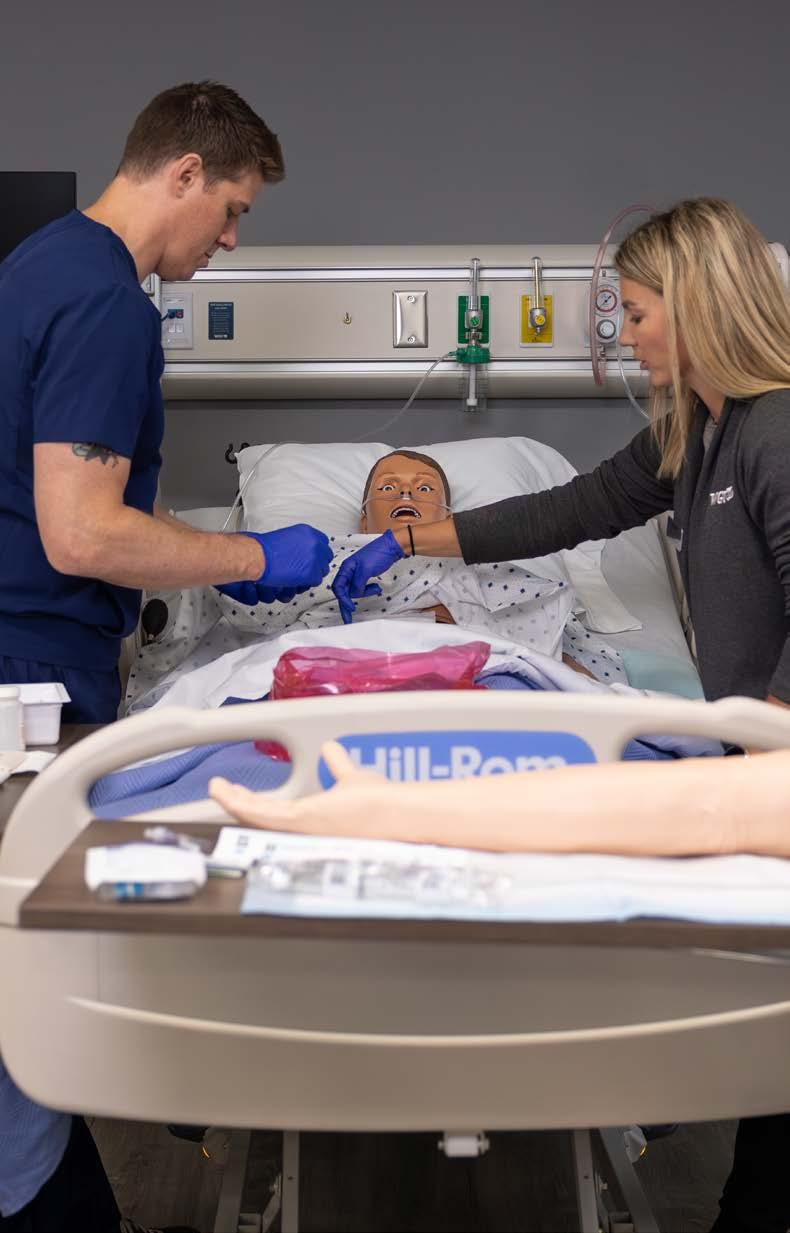
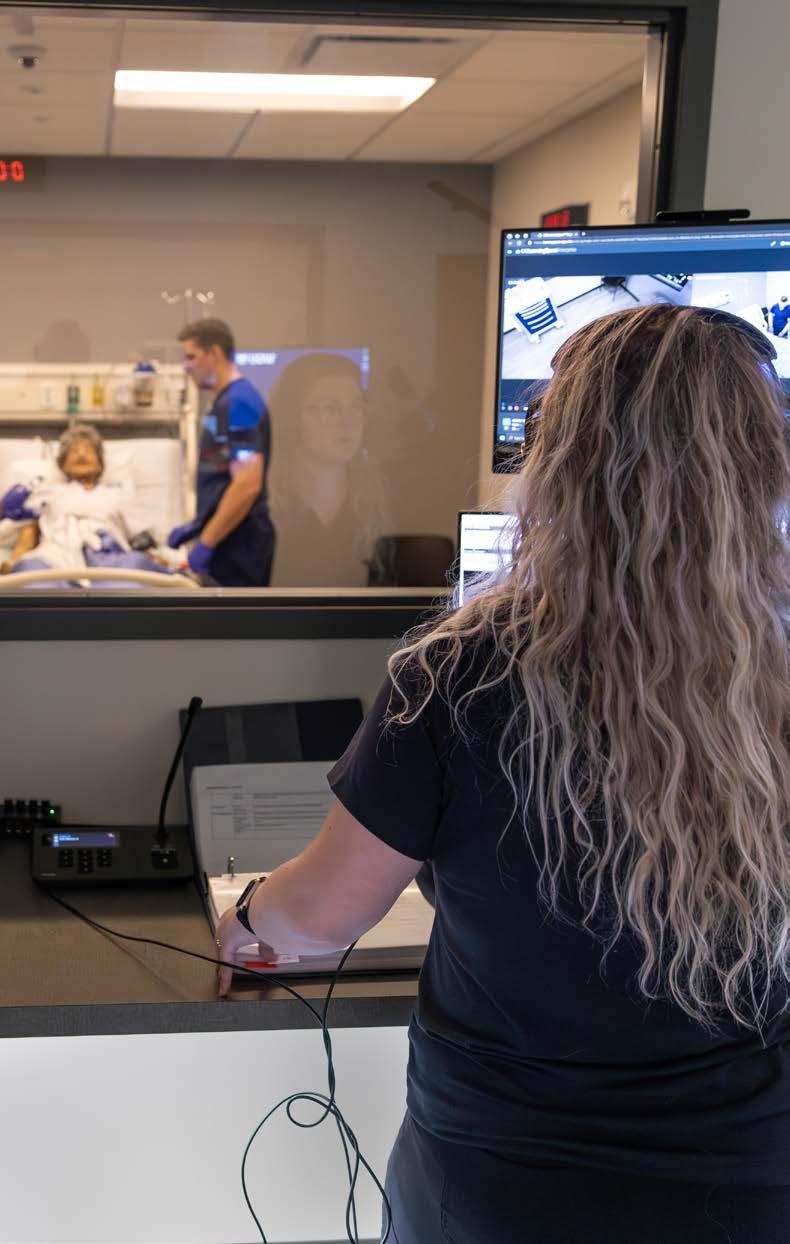
"At WGU, we’re producing nurses who are equipped to lead and contribute to improving healthcare outcomes."
ANMY MAYFIELD VICE PRESIDENT AND DEAN COLLEGE OF
NURSING “
“At WGU, our partnerships with hospitals and healthcare systems provide critical, realworld experience for our students. They’re able to practice in both urban and rural settings, ensuring that communities in need have access to quality nursing care. Our flexible model of learning helps pace through some parts of the program, thereby encouraging nursing students to enter the workforce sooner. This ultimately helps accelerate the addition of more qualified nurses in the workforce,” Mayfield says.
WGU offers clinical placements within 60 miles of students’ homes and uses simulation labs and virtual-reality simulations to prepare students for the practical demands of nursing, giving graduates the skills to transition smoothly into clinical practice.
Nursing shortages affect rural, underserved areas the most. In smaller communities, hospitals hire from a limited workforce pool and find it more difficult to recruit staff. Mayfield notes, “In our rural areas where it’s harder to get access to healthcare, we have shortages for both nursing and for advanced-practice nursing.”
One of the most significant contributions of WGU’s prelicensure program and its associated regional nursing labs is its ability to educate at scale, allowing nurses to learn wherever they live. This is particularly beneficial to rural and underserved communities, as educating residents reduces the need to incentivize nursing professionals based out of the region to relocate.
Not only are residents able to stay in their communities, but these nurses can meet the specific needs of those they serve. “Diversity in healthcare is very important, especially in rural areas. When patients see a provider who understands their cultural background, it can significantly improve the care experience,” Mayfield emphasizes. “For us, it’s important to try to train a nursing workforce that reflects our nation’s population and citizens.”
As the nursing shortage continues to burden the U.S. healthcare system, innovative prelicensure programs like WGU’s offer a scalable solution that changes a crisis to an opportunity for growth and innovation.
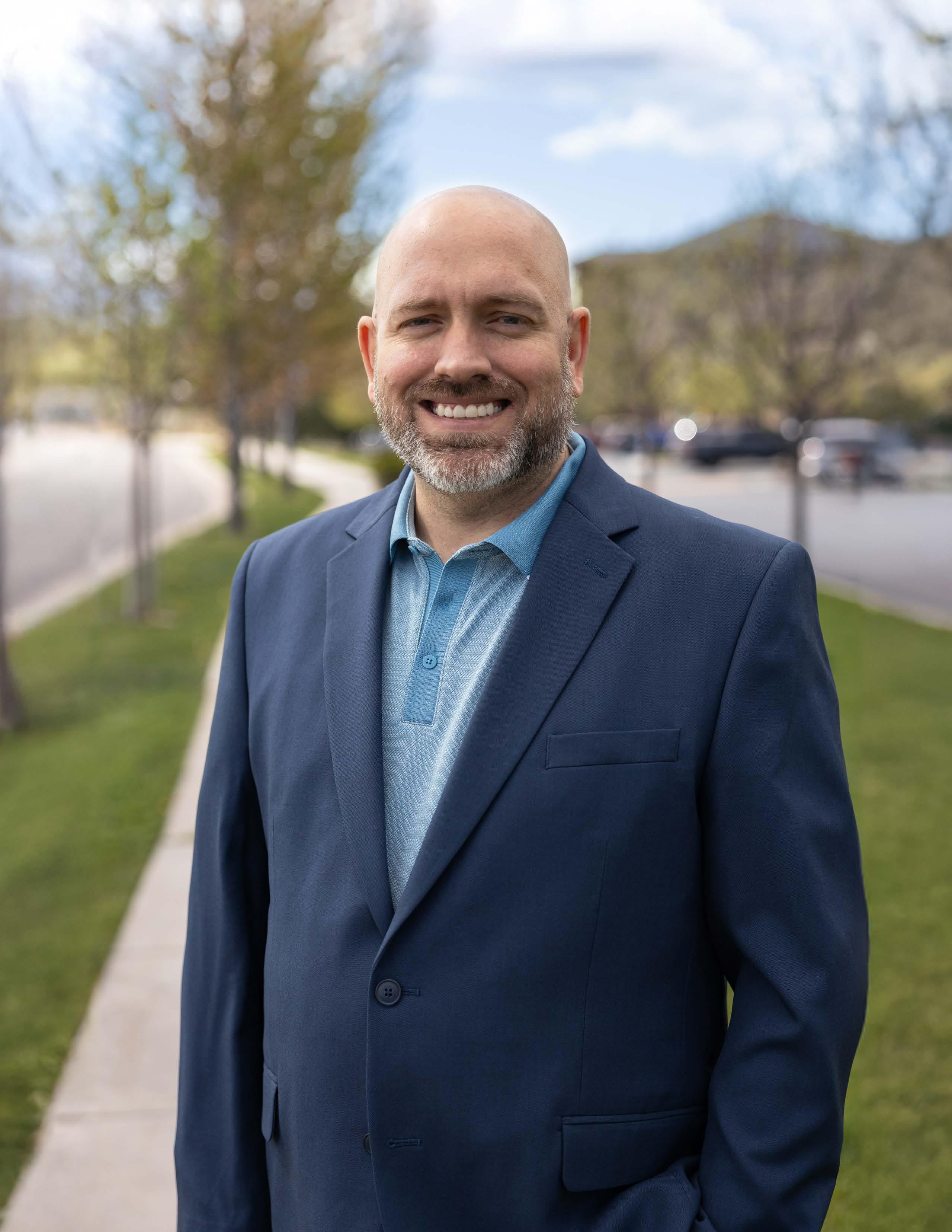
"WGU didn’t just give me a degree, it gave me the knowledge that I needed to be successful in my career."
ANDREW NYDEGGER “

To WGU alum Andrew Nydegger, education is more than just a passion; it was a second chance.
Andrew Nydegger has always been passionate about serving others. In 2004, he enlisted in the U.S. Air Force during the Iraq War, planning a lifelong military career.
But life had other plans.
In 2005, Nydegger faced a serious health crisis that required hospitalization, and doctors were perplexed about the root of the problem. It wasn’t until a nurse practitioner (NP) took control of his care that Nydegger started to finally get answers and receive the care he needed.
“She started looking a little bit outside of the box and started questioning a lot of the things that had been worked up,” Nydegger shares. Eventually, this NP helped Nydegger with his medical discharge.
Nydegger was unaware of the influence she would eventually have on his future career path.
Witnessing the profound impact of the nurses firsthand, Nydegger was inspired to care for others as the NP had cared for him. This realization spurred him to earn his bachelor’s degree in nursing, where he quickly discovered a passion for teaching the subject as well.
He decided to enroll in WGU’s Master of Nursing Education program at the Michael O. Leavitt School of Health (LSH). With work-life balance as his priority, Nydegger knew that WGU’s online program would allow him to further his education without disrupting his life. Because of WGU's competency-based model, he was able to progress through courses at his own pace rather than following a rigid schedule.
“WGU provided the ability to be a dad, to be a husband, and to be a professional nurse all at the same time,” Nydegger says. “I was able to do my studies on my time. So WGU just worked for me.”
Much like Nydegger, former Utah Governor Gary Herbert expresses the need to have multiple pathways to attain a degree. “Having WGU added to our higher-education options gives more flexibility for many people out there who otherwise would not be able to get an education. WGU provides that opportunity.”
Nydegger has become a leading figure among nurses in Utah, actively using his influence to advocate for policies that benefit healthcare workers. He is the president of the Utah Nurses Association (UNA), a nonprofit organization that represents nearly 40,000 nurses across the state. The organization aims to enhance and broaden the scope of the nursing field, pushing for it to be more inclusive and diverse by welcoming individuals of different genders, races, ages, and backgrounds.
“Nursing is both a science and an art, and both of those are developing and changing over time,” Nydegger says. “Diversity helps accelerate that change.”
Diversity in nursing directly impacts patient care. Studies have shown that a diverse nurse workforce improves patient experiences to yield better patient outcomes.
“Diversity in healthcare is very important,” LSH Vice President and Dean Anmy Mayfield says. “Oftentimes, the healthcare system is intimidating to navigate. But when patients see a provider who looks like them or understands their life’s experience or their cultural background, it can help them connect better and get the care they need.”
Like UNA, WGU strives to promote diversity within its student population. Access to affordable online education brings this opportunity to those lacking access to traditional brickand-mortar universities.
“Online education provides an opportunity for people that really wouldn’t have opportunities otherwise,” Nydegger says. “It helps create that diversity in the workforce.”
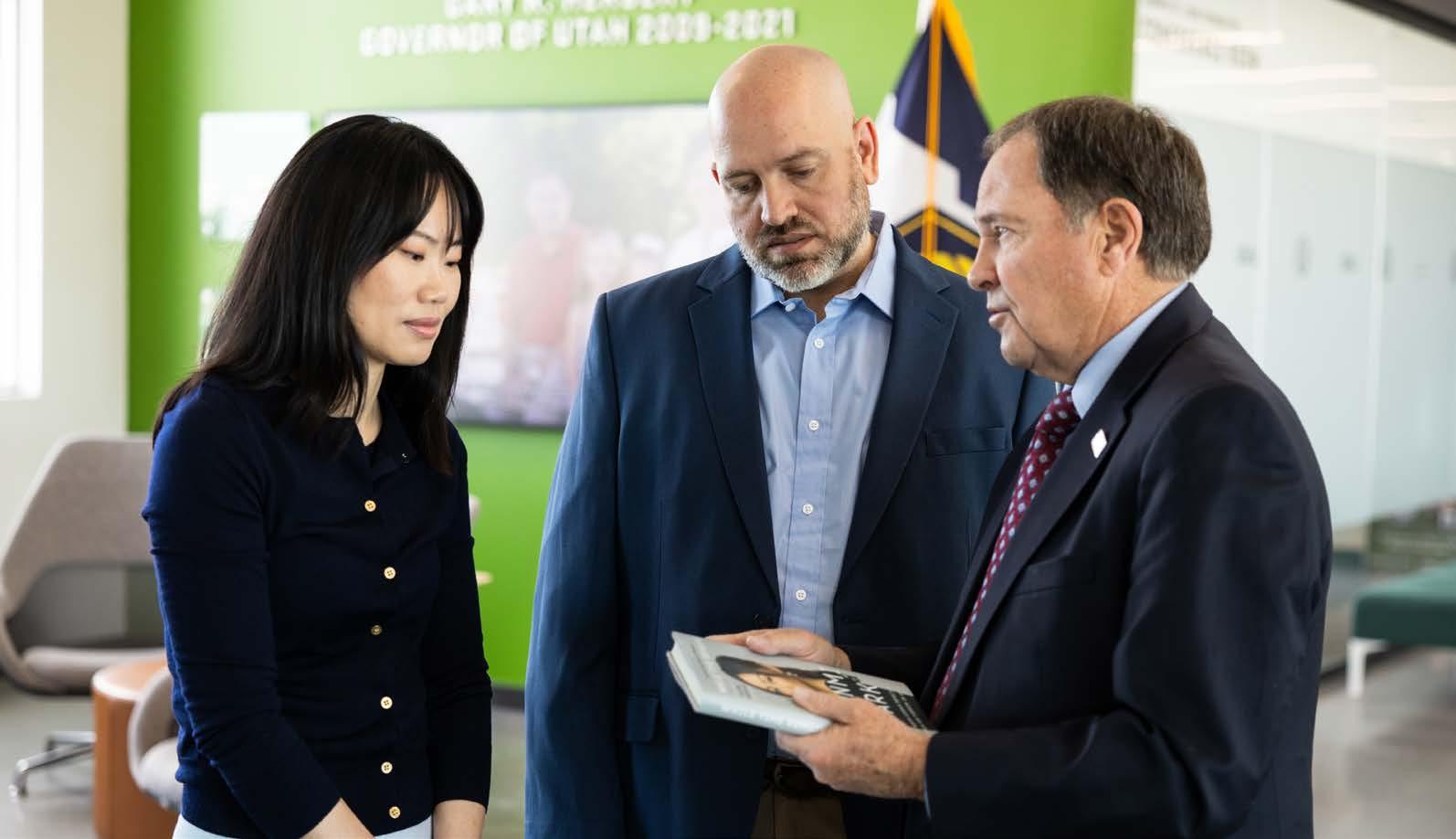


“
"Having WGU added to our higher-education options gives more flexibility for many people out there who otherwise would not be able to get an education. WGU provides that opportunity."
GARY HERBERT FORMER UTAH GOVERNOR
After graduating from WGU, Nydegger earned his doctorate in nursing administration. Today, he is the regional director of operations at a nursing college.
He is also a director for the Executive Leadership Committee of the American Nurses Association. He has stood in front of U.S. senators and representatives in Washington, D.C., advocating for laws that promote safe staffing and protect nurses against workplace violence.
Although Nydegger is a passionate nurse advocate, his impact extends to his patients, his students, his field, and the overall community.
“Watching students' eyes as they walk across that stage, knowing that they’ve not just changed their lives, they’ve changed the lives of the thousands of patients they’re going to take care of,” Nydegger says. “Knowing that I got to be a small part of that is awe-inspiring.”
Nydegger is living proof that with accessible and innovative schooling, any student can pursue their passions and fulfill their dreams.
“WGU didn’t just give me a degree, it gave me the knowledge that I needed to be successful in my career. It gave me the opportunity to move from the bedside into education,” Nydegger says. “I wouldn’t be sitting here today if it weren’t for WGU.”
Learn more about Andrew by watching his story here.

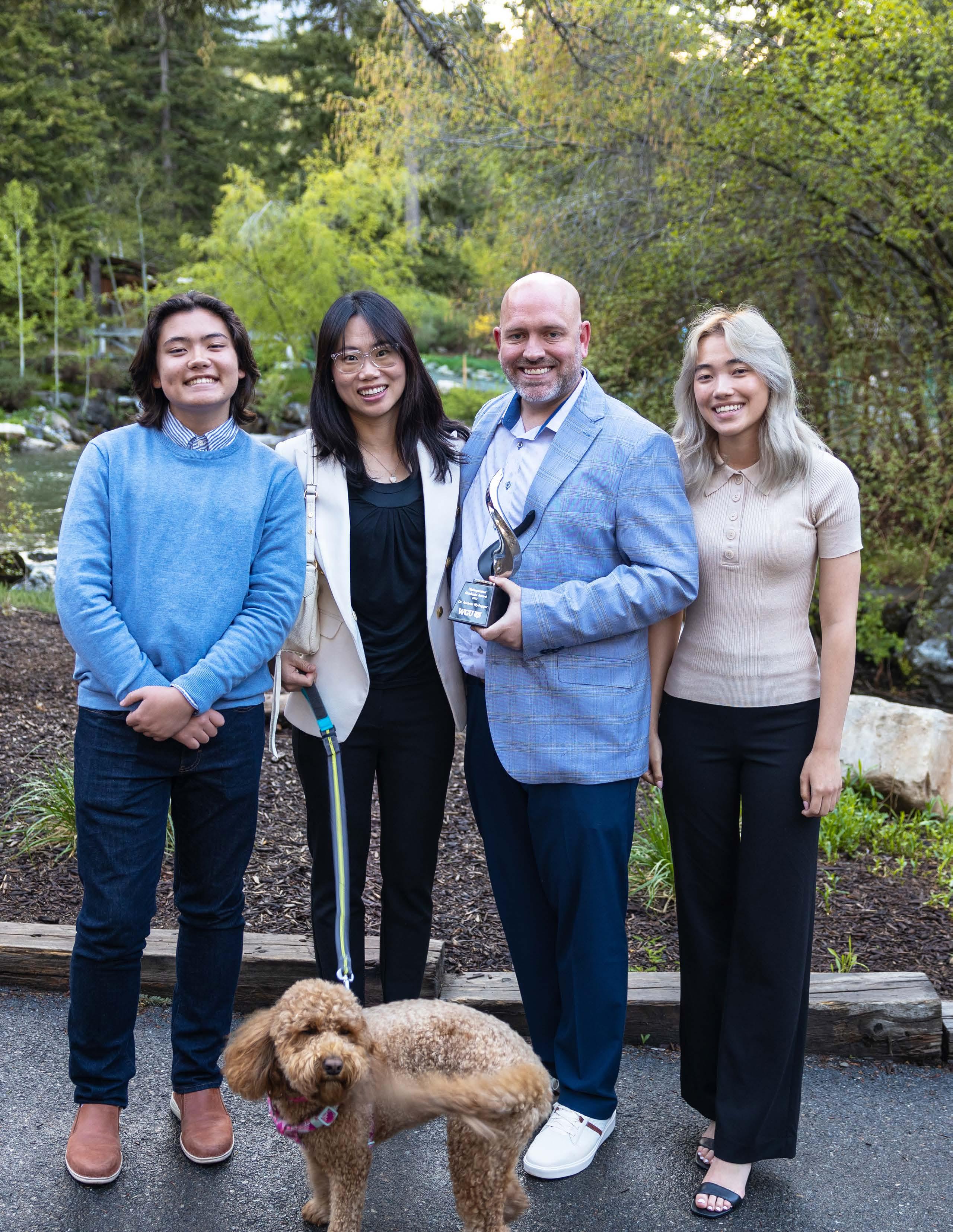
Teacher shortages are not new, but states can find new ways to address them.
WGU’s School of Education (WSE) offers innovative, flexible, and affordable teaching programs, and its approach to healthy learning can also reignite the joy of teaching in the classroom. By supporting current teachers and training the next generation of teachers, the School of Education leads the way in making teaching a lifelong career and passion.
According to the Integrated Postsecondary Education Data System, WGU is the largest conferrer of bachelor’s degrees for teachers. As the largest school of education in the nation, WGU is committed to building a pipeline of trained teachers and leaders in every state who graduate ready to lead. It does this through local student-teaching experiences and authentic learning in clinical and preclinical settings.
WGU has over 5,000 partnerships with school districts across the country, which gives students hands-on teaching experiences within their own communities. These experiences can then prepare student teachers for licensure in all 50 states through WGU’s robust licensure degree programs.
Although student-teaching experiences are local, WGU is recognized nationwide. WSE is accredited at the initial-licensure level by the Council for the Accreditation of Educator Preparation (CAEP) and Association for Advancing Quality in Educator Preparation (AAQEP). WGU is the first educator preparation provider to have been awarded full accreditation from both institutions.

Most recently, the School of Education began offering video and virtual reality experiences that provide students with opportunities to practice real-world situations in a low-stakes environment. Aspiring teachers can learn how to engage with a diverse population, including students with dyslexia and other special needs, through immersive simulations that encourage practice and improvement. After guided reflections, these teachers then apply what they’ve learned directly into the classroom.
Students are also supported by trained mentor educators as they advance through their program. Wraparound support systems like those offered by WGU foster a healthy learning environment that is grounded in evidence-based practices and research.
WGU is focused on cultivating healthy learning spaces, which are safe environments that support individuals’ and communities’ academic, physical, psychological, and social well-being. WGU’s School of Education introduced the Healthy Learning Initiative in 2022 to increase access for diverse students, improve learning outcomes, and help close attainment gaps. Healthy learning results in students who are equipped to become influential leaders in their local schools and communities.
It’s no wonder WGU has the largest Teachers College in the nation and why over 10 percent of all U.S. classroom teachers earned their degrees at WGU. With more than 100,000 educator alumni, WGU is dedicated to helping current and aspiring teachers pursue an education in a way that works for their busy lives— allowing them to improve the lives of students in the process.
To learn more about the School of Education, visit wgu.edu/education.

STUDENT ENROLLMENT
BACHELOR’S PROGRAMS
Elementary Education
Special Education
Mathematics Education
Physics Education
Biology Education
Earth Science Education
Chemistry Education
Educational Studies
ENDORSEMENT PROGRAM
English Language Learning
MASTER’S PROGRAMS
English Language Learning
Social Studies Education
Science Education
Chemistry Education
Physics Education
Biology Education
Earth Science Education
Elementary Education
English Education
Special Education
Mathematics Education
Curriculum and Instruction
Educational Leadership
Education Technology and Instructional Design
“I am so grateful for my grad degree in learning and technology, for the flexibility WGU provided to pursue it online in affordable ways and while teaching full time, and for all the professors and mentors who helped me along the way to lead from the classroom.”
Carly Maloney M.Ed. Learning and Technology 2024 Utah Teacher of the Year
A well-prepared, diverse teacher workforce is the key to unlocking a brighter future for education.
USA Today reported that 86% of public school districts had trouble filling open teacher positions, and 45% of public schools said they were understaffed at the start of the 2023–2024 school year (Schermele, 2023). While teacher shortages vary by state, WGU’s accredited, nationwide programs provide aspiring and current educators with flexible pathways to earn their degrees and advance in their careers.
Competency-based education (CBE) and teacher apprenticeships present promising solutions to the challenge of ensuring that students have access to wellprepared, diverse teachers. They offer a comprehensive approach that supports educator success and recruits diverse candidates.
Dr. Stacey Ludwig Johnson, Senior Vice President and Executive Dean of the School of Education, emphasizes the need for a comprehensive approach that supports educator success and recruiting diverse candidates.
“When we talk about competency-based education, we’re not just talking about earning a credential,” says Ludwig Johnson. “It’s about aligning skills with future employment needs—making sure that every student can succeed in their role from day one.”
DR. STACEY LUDWIG JOHNSON VICE PRESIDENT + DEAN SCHOOL OF EDUCATION “
"It’s about aligning skills with future employment needs—making sure that every student can succeed in their role from day one."

Competency-based education (CBE) gives teachers the confidence they need to lead a classroom without having to leave their communities. Students are rigorously tested to determine whether they have the skills to become teachers. They must master the science behind learning processes, develop personalized learning plans, and implement online pedagogical tools. As a result of this unique approach to learning, all WGU-trained teachers graduate ready to lead.
CBE focuses on real-world outcomes, equipping future teachers with practical skills that especially benefit those from diverse or nontraditional backgrounds. WGU’s School of Education is also steeped in academic disciplines, pedagogical knowledge, and understanding of research-based best practices, with students acting as reflective practitioners who are aware of multiple perspectives and contexts.
Many aspiring teachers dread the unpaid student-teaching requirement, which mandates that they forego income and benefits to teach in the classroom. Teacher apprenticeships address this issue by allowing students to “earn while they learn,” embedding them in classrooms for paid, on-the-job training alongside experienced mentors.
“Many of our students—often from underrepresented populations—are required to quit their jobs just to complete student teaching,” Ludwig Johnson explains. Apprenticeships remove the financial strain and help recruit
diverse candidates from local communities. Diversity in the teaching workforce is crucial for improving student outcomes. Research from the Teachers College Record shows that students perform better with teachers who share similar backgrounds. Teacher apprenticeships can attract candidates from underrepresented communities by reducing the cost of earning a teaching degree while providing financial support for on-the-job training.
Addressing the teacher shortage requires innovative, collaborative solutions. Policymakers can support teacher preparation programs by expanding access to competencybased education models and apprenticeships.
Ludwig Johnson sees these teacher preparation programs as the future of education, “If we can keep teachers in the classroom longer and provide them with the tools to succeed, that’s how we’ll impact the teacher shortage meaningfully.”
Competency-based and apprenticeship models can build a highquality teacher workforce in communities that need teachers the most. Through initiatives that make the teaching profession more accessible, states can ensure that every child has access to a qualified, dedicated teacher. To learn more about building a passionate and prepared teacher workforce, tune in to the Sage Advice podcast with Dr. Stacey Ludwig Johnson.
“If you don’t actually fix what ails higher ed, the entire system cannot be changed.”
Michael Horn is passionate about helping colleges and universities chart a more sustainable future that supports the different goals of learners and society. As the cofounder of the Clayton Christensen Institute for Disruptive Education and a prominent leader in educational innovation, Horn is a proponent of competency-based education (CBE) because it uniquely addresses the pressing needs of today’s learners and the evolving job market.
WGU Vice President of Government Relations Chris Bonnell recently sat down with Horn to discuss how WGU’s CBE model is revolutionizing the path to success in higher education. The following is a summary of their conversation.
While traditional education models often prioritize time spent in classrooms over mastery of skills, CBE fundamentally redefines scholastic success by allowing learners to progress based on their demonstrated understanding and application of knowledge.
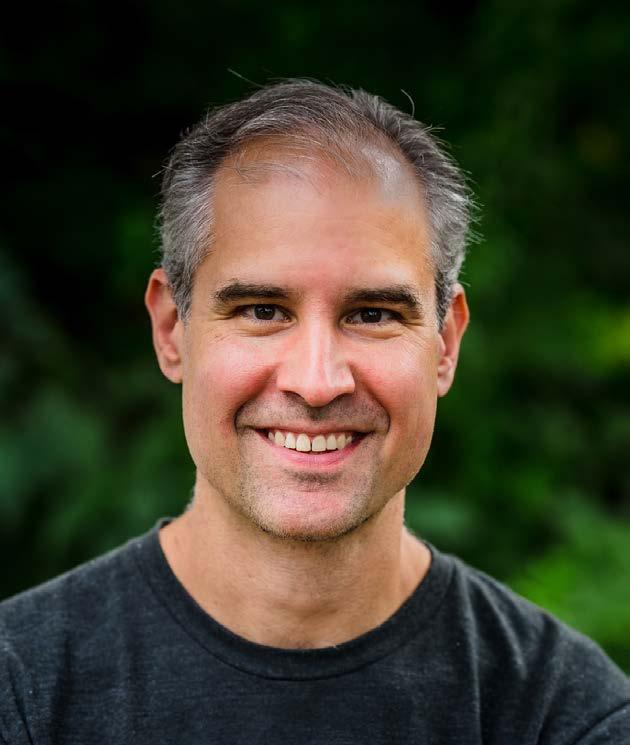
Horn suggests that this shift is particularly beneficial for adult learners and those with prior experience because it “empowers learners to focus on mastering the skills that are most relevant to their careers.” He views the CBE model as a way to provide a more effective and personalized learning experience because it directly applies to their work.
Horn also champions CBE for its potential to make education more affordable and accessible. He points out that institutions like WGU have successfully implemented tuition models that allow learners to complete as many courses as possible within a term, reducing the overall cost of obtaining a degree. “WGU has built something remarkable—a genuinely low-cost education model that doesn’t compromise on quality," shares Horn. This affordability, combined with the flexibility of CBE, opens doors for many who might otherwise be excluded from higher education. As Horn explained, “The biggest thing to me is to make sure that every student has a real choice about where they go in their education.”



With the rapid evolution of the job market, Horn believes that CBE’s emphasis on realworld application and integrating industryrelevant certifications ensures that learners are knowledgeable and job-ready from day one.
The alignment between education and workforce needs is crucial in a landscape where skills gaps are widening. Horn’s philosophy also reflects a broader vision for inclusive education. He believes that by breaking down traditional barriers to postsecondary education, CBE provides pathways to success for diverse learners. This commitment to inclusivity ensures that all learners, regardless of background, can benefit from an education tailored to their individual needs.
"WGU has built something remarkable—a genuinely low-cost education model that doesn’t compromise on quality."
MICHAEL HORN “
To hear the full conversation between Michael Horn and Chris Bonnell, check out the episode “The Future of Learning through Disruptive Innovation” on the Sage Advice podcast.

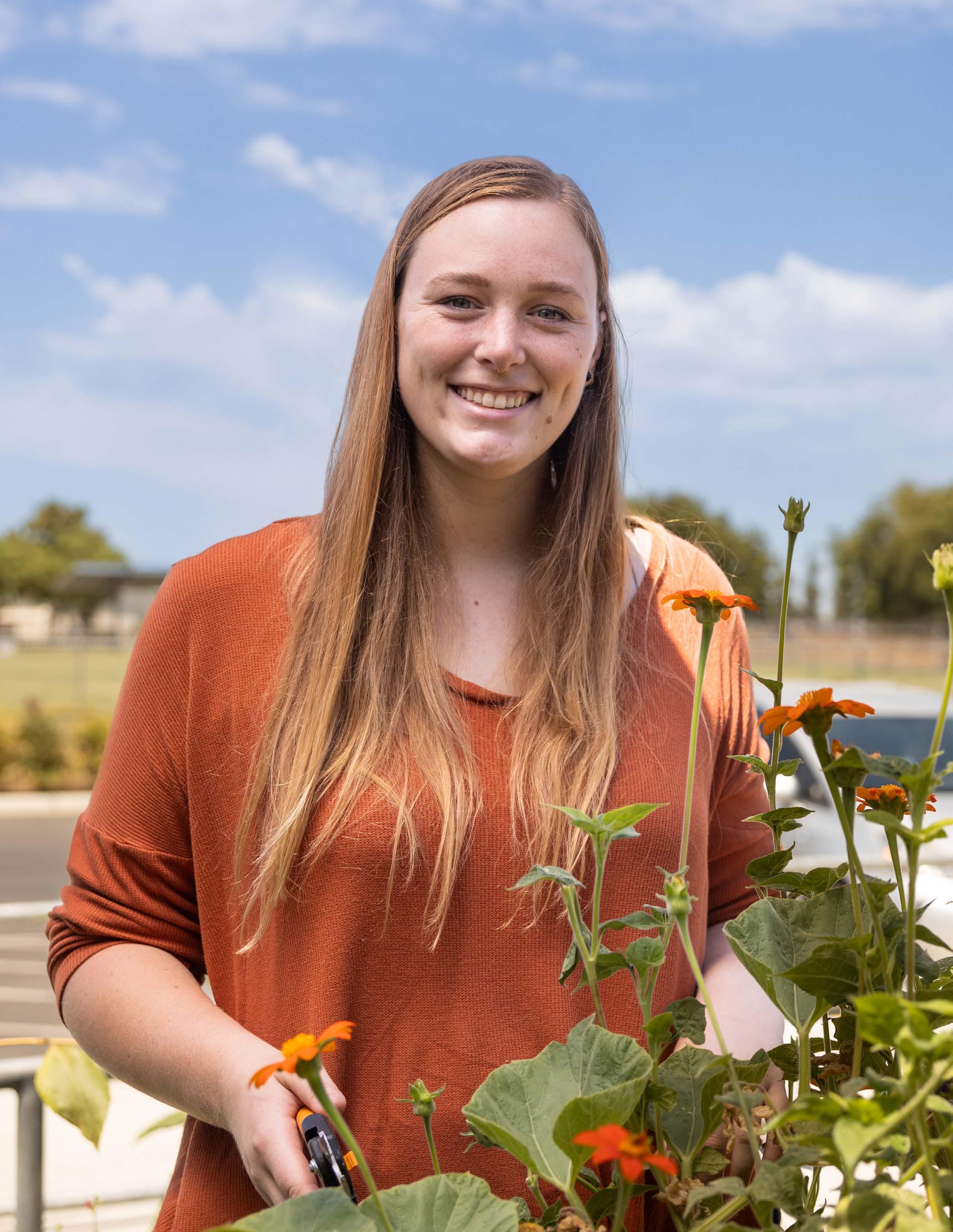
“They’re Full of Potential” Amber’s Story
How one teacher meets the unique needs of at-risk
California has experienced a consistent shortage of teachers for a decade—and this crisis particularly affects priority schools where students face the greatest obstacles to academic success.
In response to this ongoing challenge, the state has taken a multifaceted approach, including initiatives like the Golden State Teacher Grant (GSTG) program. Through the grant, California students can receive financial assistance while pursuing a teaching degree at an institution of their choice, including WGU.
The true impact of these policy efforts is best understood through stories like Amber Donat’s, a WGU graduate and teacher in Fresno who is transforming lives with the help of WGU’s flexible educational model.
Donat’s journey to teaching at a priority school took time and effort. Growing up in an affluent part of California, Donat was surrounded by opportunities that many of her future students would never experience. Through her work with Fresno Metro Ministry, a nonprofit focused on food security and community gardens, Donat realized that she wanted to work more directly with youth to help them gain the tools needed to change their futures.
“I worked with local farmers and community gardens,” Donat recalls, “but I wanted to do more than just create access to food—I wanted to help young people see the potential in themselves.”
This drive to make a lasting impact led Donat to pursue a career in education. She decided to transition into teaching, knowing that she wanted to work in a priority school where she could help students facing barriers like poverty, gang involvement, and family instability.
Donat’s desire to be part of the solution aligned with California’s larger goals, as articulated by State Superintendent Tony Thurmond, who has long emphasized the importance of recruiting dedicated teachers for high-need areas.
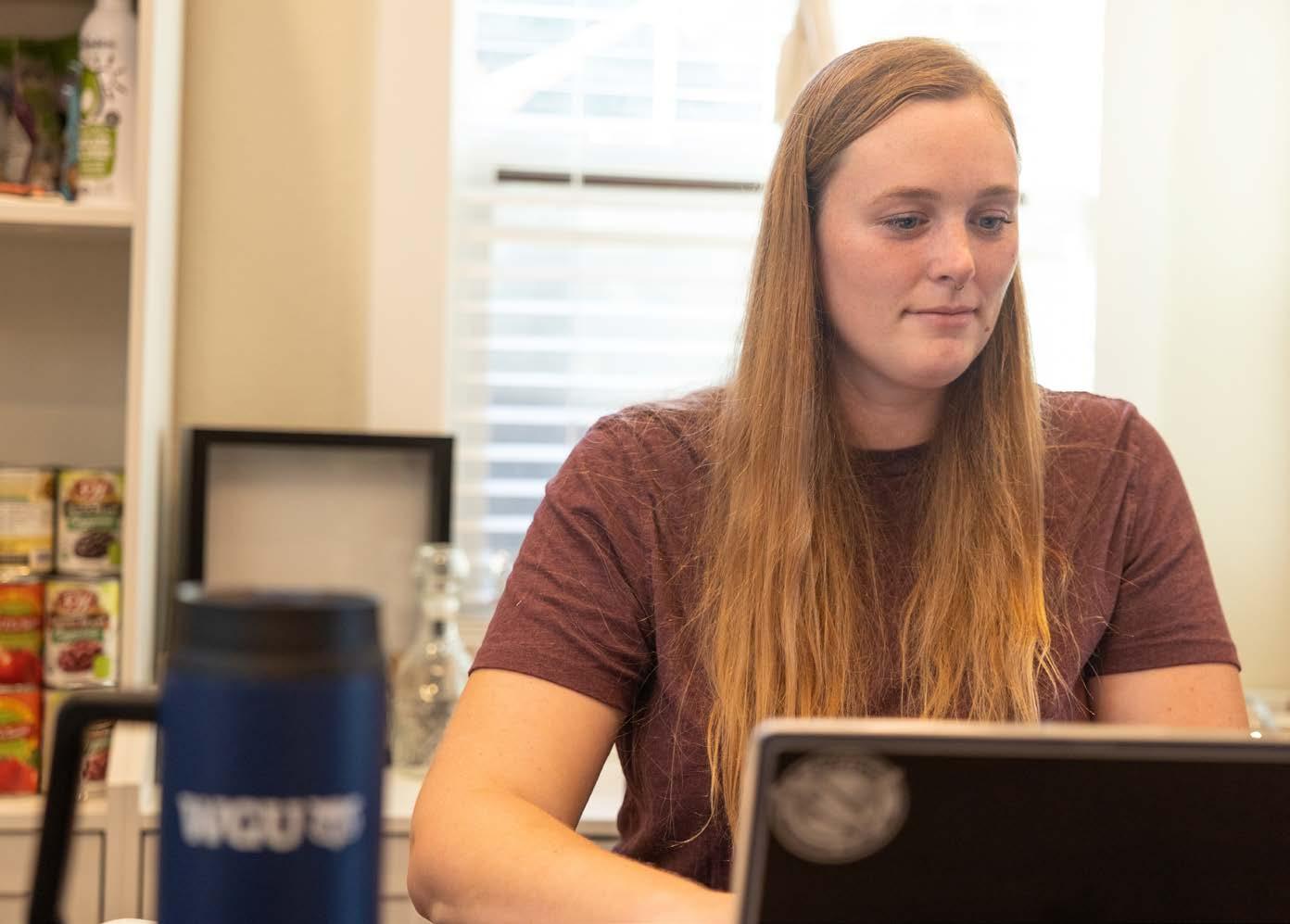
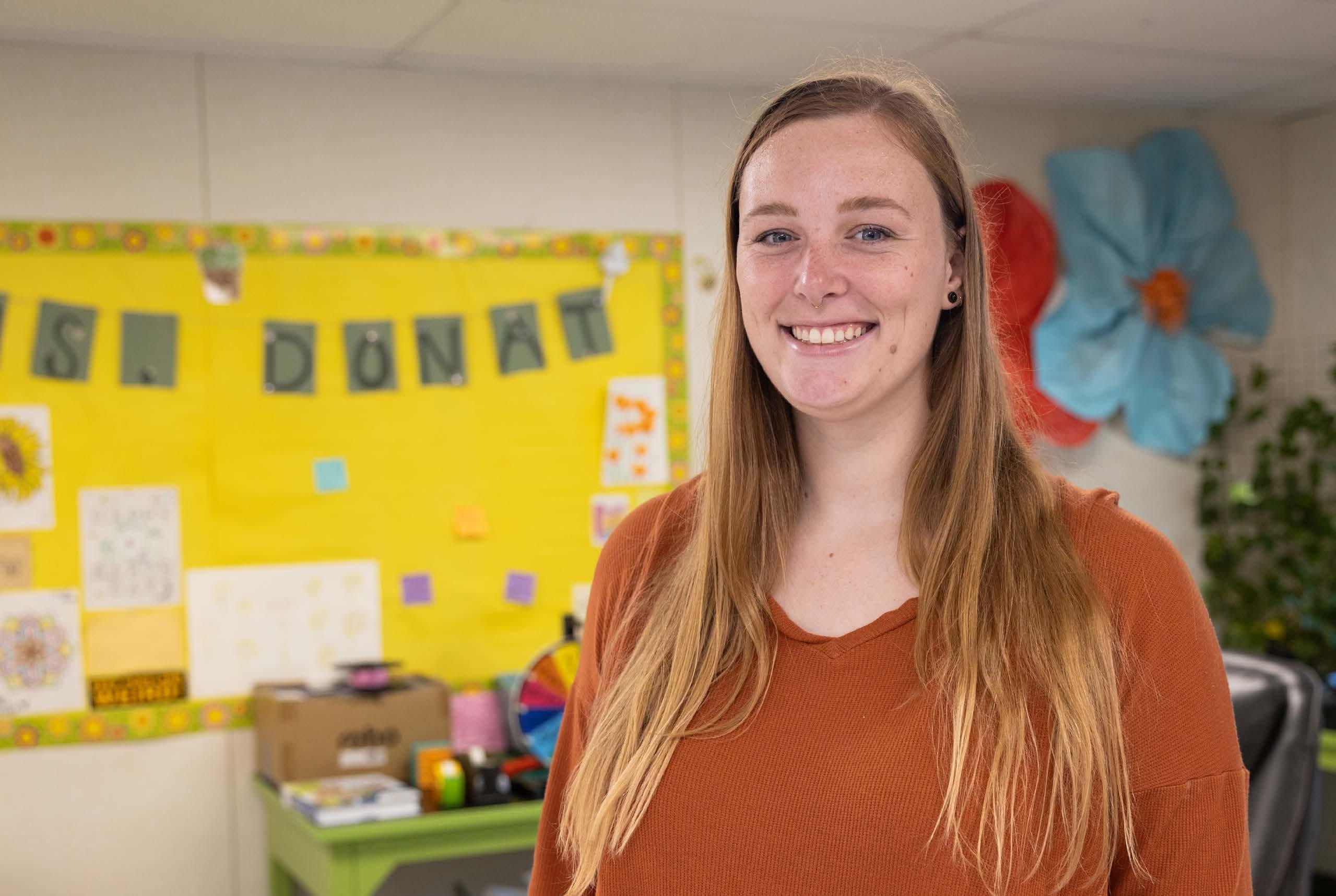
California’s priority schools are K–12 public schools with more than 55% of pupils classified as English learners, eligible foster youth, and and those qualified for free or reduced-price meals.
Donat found her calling at Phoenix Secondary Academy in Fresno, which specializes in serving students who have struggled in traditional educational settings.
“The students here need something different,” she explains. “They’ve often been overlooked, but they’re full of potential.”
At Phoenix Secondary, Donat launched a course on sustainable agriculture that teaches students about regenerative farming practices, the environment, and how to be good stewards of the land. For many of her students, this hands-on course offers
an opportunity to connect with nature while learning valuable skills they can carry into the workforce.
“These students are learning to take care of the land, but they’re also learning to take care of themselves and their futures,” Donat says.
Donat’s work exemplifies the type of educator State Superintendent Thurmond envisions for California’s schools. Thurmond has frequently discussed the need for innovative teaching approaches and the importance of building trust with students, particularly in schools serving vulnerable populations.
“We want to see more teachers who can connect with students on a personal level, teachers who understand the challenges their students face and are committed to helping them overcome those challenges.” Thurmond says.


"I wanted to do more than just create access to food—I wanted to help young people see the potential in themselves."
AMBER DONAT “
For Amber, the decision to enroll in WGU’s Master of Curriculum and Instruction program was a practical one. As a full-time teacher working in a priority school, she needed a program that could fit into her life, not the other way around.
“I chose WGU because of the flexibility,” she explains. “I could take classes when it worked for me, and the competency-based model allowed me to move through the material at my own pace.”
WGU’s online model allowed Donat to balance her demanding work schedule with her academic goals, and the support she received from WGU made a difference in her classroom. The curriculum directly applied to her work at Phoenix Secondary, giving her the tools to better understand individualized learning needs and develop lesson plans that resonate with her students.
“WGU gave me the confidence that what I’m doing in the classroom aligns with best practices,” Donat explains. “I’ve been able to tailor my teaching to meet the unique needs of my students, and I know that I’m helping them succeed.”
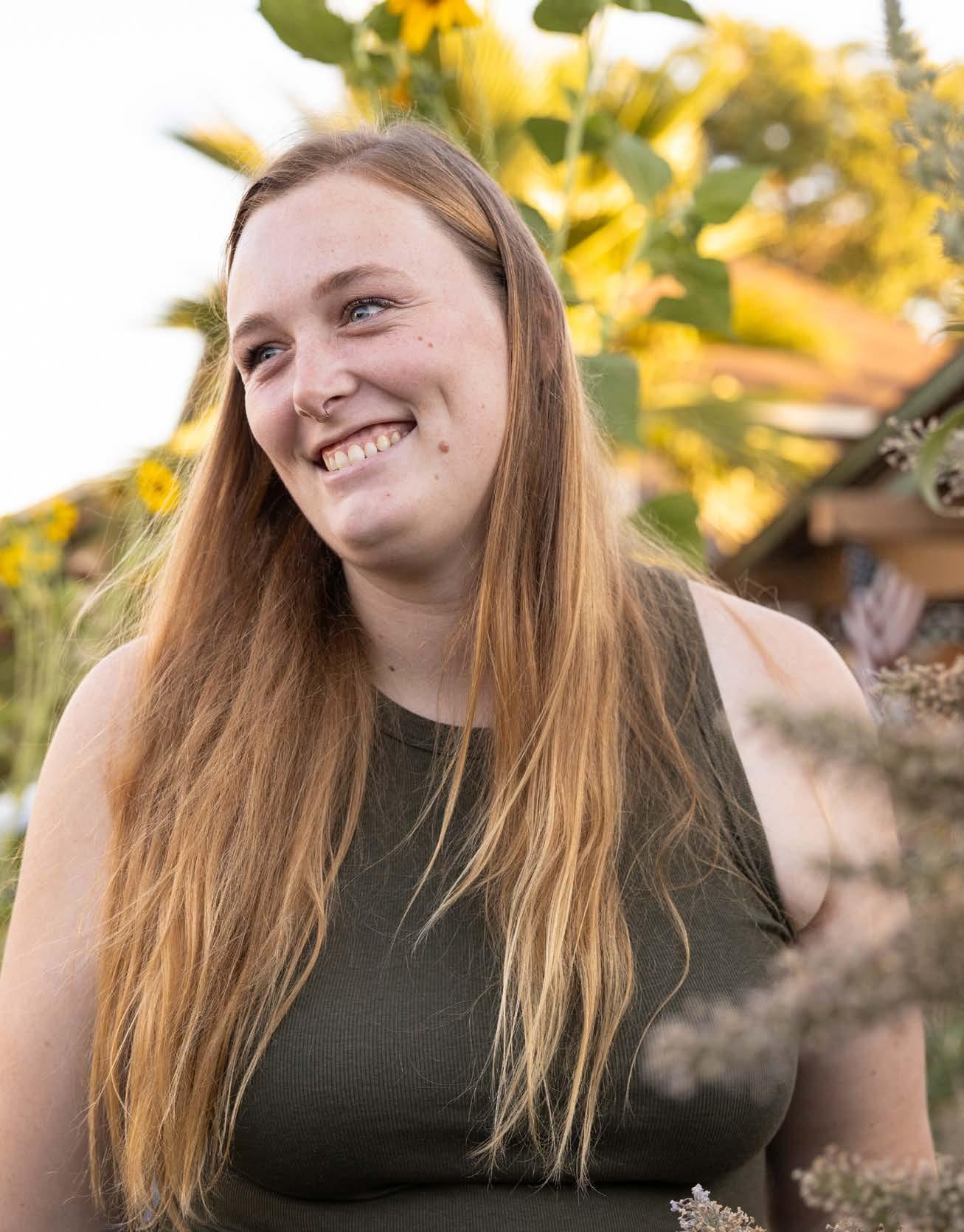
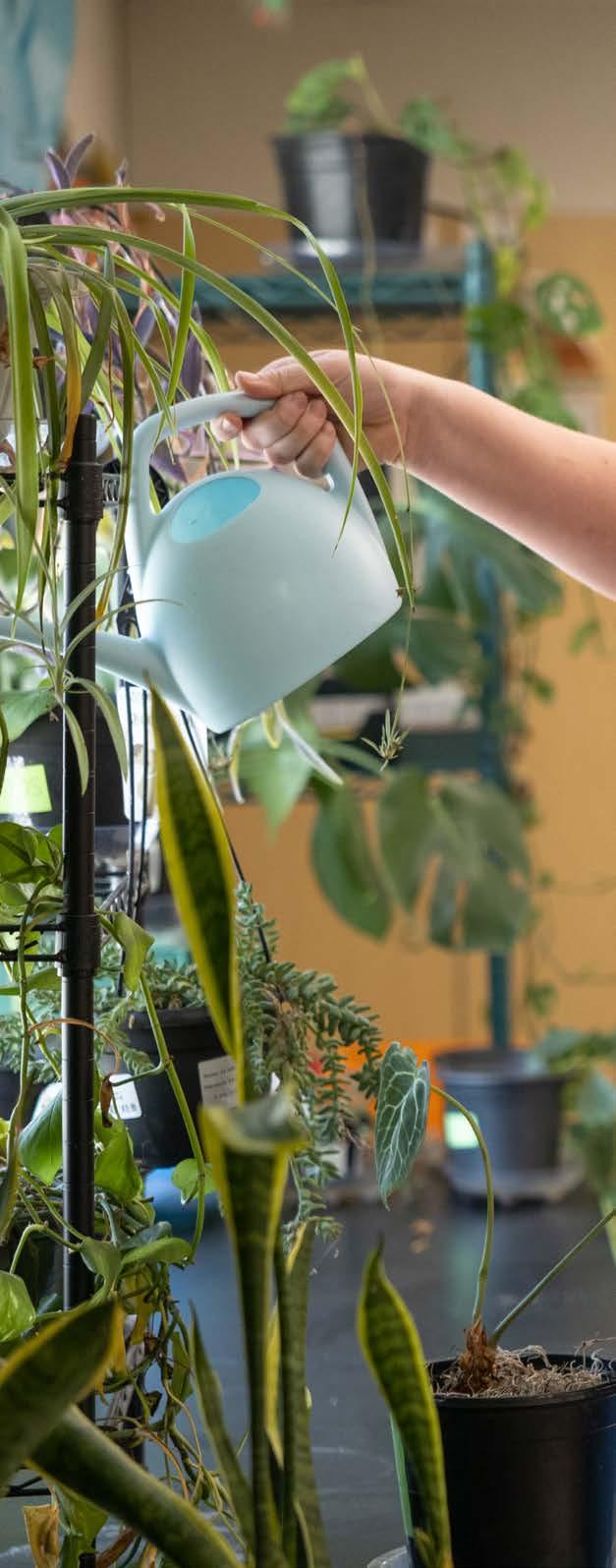



"I’ve been able to tailor my teaching to meet the unique needs of my students, and I know that I’m helping them succeed."
AMBER DONAT “
The Golden State Teacher Grant (GSTG) program plays a crucial role in California’s effort to recruit more teachers like Amber into priority schools. The GSTG provides up to $10,000 annually to students enrolled in teaching credential programs at WGU who commit to teaching in high-need areas for at least four years. By reducing the financial burden of pursuing a teaching career, the GSTG is making it possible for more Californians to enter the profession, particularly in underserved communities.
“Programs like the GSTG are essential,” says Thurmond. “We need to remove financial barriers for aspiring teachers, especially those who are willing to work in the communities that need them most.”
Thurmond’s focus on providing pathways for diverse recruitment is central to California’s strategy for closing achievement gaps and ensuring every student has access to a high-quality education.
Donat’s journey from nonprofit work to teaching at Phoenix Secondary is a powerful example of the impact that dedicated educators can have on the lives of their students. With the support of WGU, Donat has been able to pursue her passion for teaching while continuing to make a difference in her community.
California’s education system is at a crossroads, and teachers like Donat are leading the way forward. By investing in programs like the Golden State Teacher Grant and partnering with institutions like WGU, the state is ensuring that every student has access to a quality education—and that teachers like Amber Donat have the support they need to succeed.
Learn more about Amber by watching her story.
The business world is constantly changing, and WGU’s School of Business is keeping pace.
WGU’s School of Business (WSB) offers career-aligned, affordable programs designed to give students the skills they need to thrive in today’s business world. Led by Senior Vice President and Executive Dean Mitsu Frazier, WSB empowers students to learn at the speed of business and earn the skills they need to achieve their professional goals.
Almost 20% of all conferred bachelor’s degrees are in business, but WSB stands out because of its direct alignment to current and future workforce demands.
WGU boasts industry leaders like Google, Microsoft, AT&T, and HP among its advisory groups, as well as recent partnerships like the Women of Project Management and National Black Chamber of Commerce. These expanded associations ensure that students graduate knowing how they can make an immediate impact in the workforce.
WGU’s innovative approach to business education has not gone unnoticed. The M.S. Accounting degree is ranked second nationally in master’s degree conferrals, and WSB is the largest conferrer of accounting degrees in the United States. Even more impressive is the fact that WGU graduate accounting students have exceeded other online universities’ pass rates on the CPA exam. Because WGU is a trusted educational institution, Amazon Career Choice, KFC, and T-Mobile have partnered with WGU to offer professional training for their employees who want to level up in their careers.

WGU recognizes that business curriculum can quickly become outdated without regular updates, especially given the dynamic nature of business demands. To meet this challenge, WSB is continuously innovating curriculum to align with professional job requirements and industry needs.
WGU also launched one-year MBA and M.S. Management and Leadership degrees, enabling students to earn their degrees for less than $10,000.
The cost of a business degree is even more affordable when considering WGU’s industry partnerships. For instance, WGU’s Bachelor of Science in User Experience Design curriculum was developed based on industry research in partnership with IDEO. The curriculum was integrated with employer feedback to provide students with the opportunity to build a professional portfolio and personal brand that enhances their marketability.
Additionally, WGU worked with HubSpot to offer marketing students the chance to pursue a microinternship with the software company. Aspiring marketing professionals can create professional marketing campaigns for organizations that partner with HubSpot, and 300 marketing students are already participating.

The purpose of WSB’s innovative programs is to align business education with employer needs and prepare students to make an impact at the pace of today’s business world—while also preparing for the needs of tomorrow. With more than 100,000 business degrees conferred, students and organizations can know that WGU degrees offer real-world application and industry relevancy.
The speed of business is not slowing down, and neither is WGU’s School of Business.
To learn more about the WGU School of Business, visit wgu.edu/business.
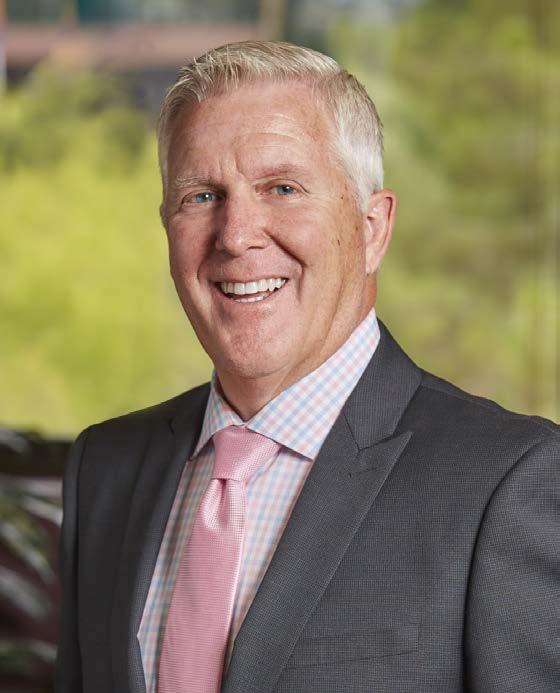
STUDENT ENROLLMENT
Over 50,000 active students and more than 100,000 graduates
BACHELOR’S PROGRAMS
Business Management
Healthcare Administration
Human Resource
Management
Information Technology
Management
Marketing
Supply Chain and
Operations Management
Communications
User Experience Design
Accounting
Finance
MASTER’S PROGRAMS
Master of Business Administration
MBA Information Technology
Management
MBA Healthcare Management
Management and Leadership
Accounting
Marketing
Human Resource Management
CERTIFICATES
Leadership
Supply Chain
Accounting Fundamentals
Digital Marketing and E-Commerce
“When I decided to pursue a B.A. degree from WGU, I had the responsibility of leading an organization of 3,000 team members. Despite my significant work responsibilities, the WGU approach allowed me to combine past work experiences with knowledge gained through my studies. This approach allowed me to successfully fulfill both my work responsibilities and my classroom studies.”
Kevin
Phelps, Glendale, AZ
B.S. Business Administration–Business Management (2013)
Thanks to an innovative partnership between the Kentucky Fried Chicken (KFC) Foundation and WGU, eligible KFC restaurant employees have the opportunity to earn a college degree with 100% tuition coverage. Through this program, KFC restaurant employees can choose from more than 60 bachelor’s and master’s degree options.
The initiative not only reflects KFC’s dedication to its workforce, but also positions the company as a leader in employee development. With WGU’s CBE model, students develop skills that they can immediately apply to their roles at KFC which benefits the individual learner and the KFC team.
Because of this partnership, KFC restaurant employees can select degrees in high-demand fields such as business, information technology, education, and healthcare, aligning their studies with their career goals. Students at WGU progress at their own pace, focusing on mastering skills and knowledge rather than clocking classroom hours, making WGU ideal for employees balancing work priorities with their education


“Every year we look for new ways to support and enhance the lives of KFC restaurant employees,” says Emma Horn, Executive Director of the KFC Foundation. “What better opportunity to be able to offer team members than a flexible college degree program from Western Governors University that can fit seamlessly into their schedule.”
With flexibility for adult learners as a top priority, WGU offers rolling admissions and monthly start dates, meaning employees can start as soon as they’re ready. Not only do employees have the confidence to pursue a degree with their employer as part of their support system, but they can seamlessly integrate their education into their schedules.
“Growing up, we lived in poverty. When I got my undergraduate degree, that sparked a lot of interest in my siblings to earn a degree. I want to show them and those in a similar position that we were in, that our upbringings don’t define who we are, and show them the heights of how far they can go.”
Kevon Pascoe, Spring Hope, NC Master of Business Administration (2023), M.S. Management and
Leadership
(2024)

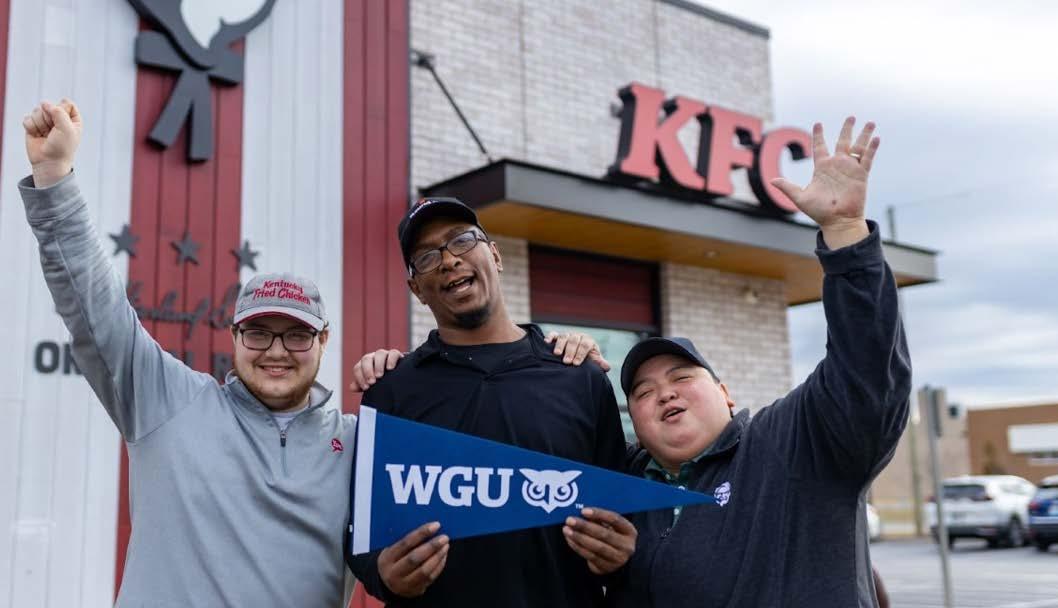

KFC’s tuition-coverage program is noncompetitive, meaning that every eligible employee receives funding. This approach further eliminates barriers to entry and provides a clear path for all employees to pursue higher education.
“Talent exists within every individual, but the keys to unlock it can vary for each person,” says WGU President Scott Pulsipher. “Tens of thousands of KFC restaurant employees across the country can now further advance their lives, and that of their families and communities, by accessing and completing education programs that are relevant and personalized. I’m thankful that the KFC Foundation has entrusted WGU as its education partner to expand pathways to opportunity for KFC restaurant employees.”
By covering tuition, KFC is making higher education accessible to all eligible team members from their first day on the job.
This partnership is more than just an educational opportunity. It’s an investment in the future of KFC’s workforce, empowering employees to enhance their qualifications, meet the demands of an evolving job market, and build sustainable careers. KFC is committed to supporting lifelong learning, paving the way for its employees to reach new heights both within the company and beyond.
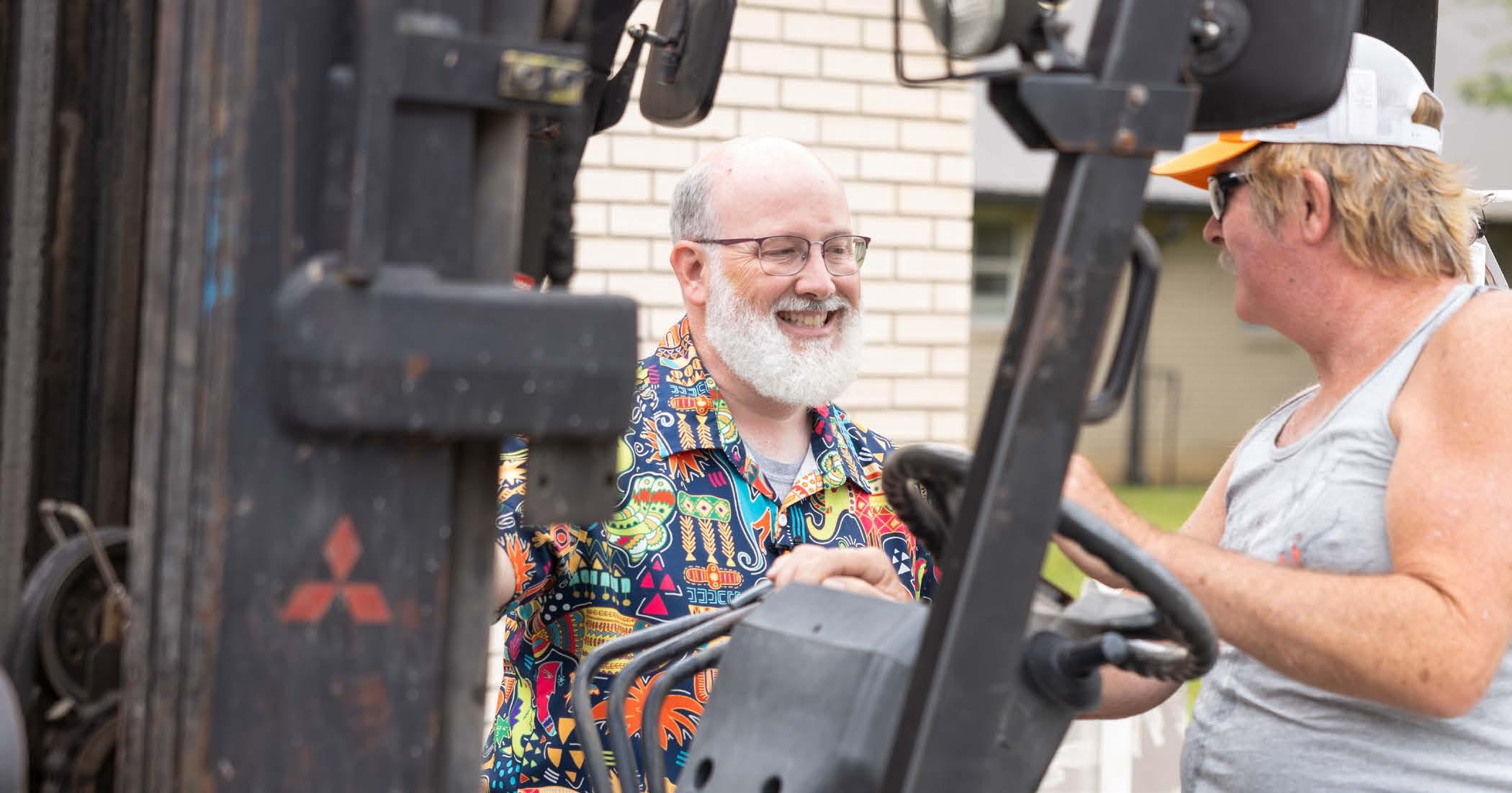
For David Statum, feeding 1,500 families every week is all about creating the supportive, nurturing environment he had at WGU.
In the heart of rural Tennessee, where resources are sometimes limited but community ties are always strong, David Statum is a source of hope for thousands in the region. Since 2019, he has run the largest food-distribution program in the area. Statum always had a passion for service, but he credits WGU for instilling the confidence that helped him bring his vision to life.
His journey illustrates how WGU can empower individuals to make a lasting impact in their communities.


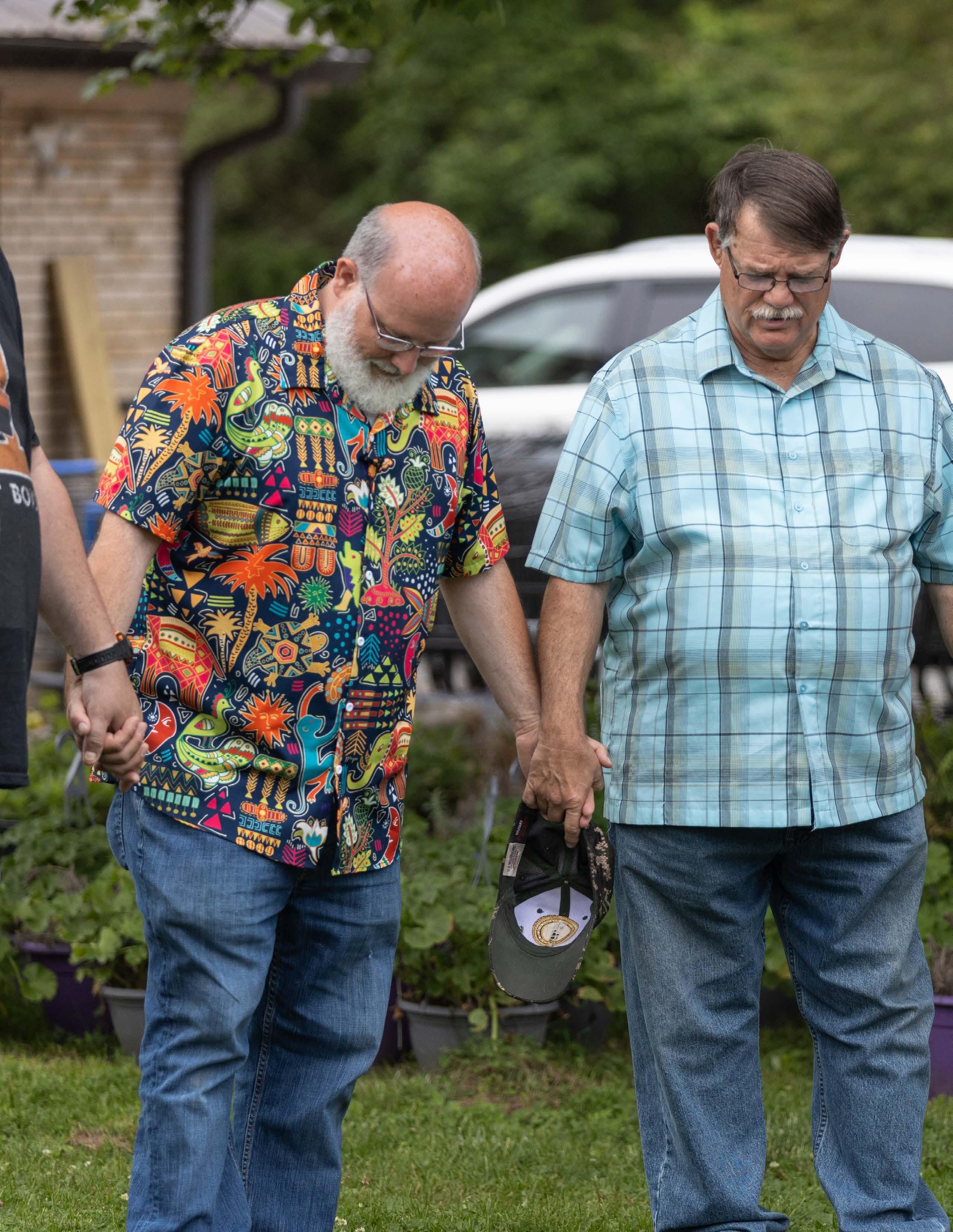
"The education I received from WGU wasn’t just about medical knowledge, it was about learning to lead, to serve, and to make a difference. WGU gave me the tools to create a safe and supportive environment for others."
DAVID
STATUM “

Statum’s story begins in Tullahoma, Tennessee. He dreamed of building a career based on service, which is why he pursued a degree in nursing. However, Statum faced significant challenges living in a rural area where access to higher education was limited. His daily four-hour commute to attend a traditional nursing school in Nashville was grueling and took precious time away from his family and work.
Determined to find a solution to fit his demanding schedule, Statum discovered WGU. The university’s online, asynchronous and competency-based model offered him the flexibility he needed, enabling him to earn a bachelor’s degree in nursing without the logistical burdens of a conventional program. His experience was so positive that he went on to pursue a master’s degree in nursing education with WGU.
“WGU’s model allowed me to learn at my own pace and apply my knowledge directly to my work,” Statum reflects. “It gave me the confidence to step beyond the clinic and into broader community service.”
Serving his community became a top priority amid the upheaval of the COVID-19 pandemic. Statum watched his rural community slip into crisis as neighbors were going hungry due to food shortages. In response, Statum set to work in founding Family Food Ministry (FFM), which addresses the pressing issue of food insecurity and skillfully organizes partnerships with Tennessee food distributors for donations. Today, volunteers gather at Westside Nazarene Church each week to distribute approximately 1,000 pounds of food to about 1,500 needy families. The operation is a well-oiled machine run by a committed team of 50-100 volunteers led by Statum.
“The impact we make goes beyond just feeding people,” Statum explains. “It’s about offering hope, dignity, and respect. Food brings people together and strengthens our community.”
Statum’s initiative relies solely on donations, and he has found personal meaning giving back to the place he calls home. “We work in rural areas because people there often have a harder time accessing resources. It’s our mission to be where others aren’t, and it’s a passion that drives us to make a tangible difference.”


Statum attributes his success not only to his personal dedication but also to the educational foundation provided by WGU. The university’s support and flexibility allowed him to gain the skills necessary for both his nursing career and his community-focused endeavors.
“The education I received from WGU wasn’t just about medical knowledge,” Statum notes. “It was about learning to lead, to serve, and to make a difference. WGU gave me the tools to create a safe and supportive environment for others.”
Statum’s experience at WGU inspired him to recreate supportive, nurturing environments through Family Food Ministry, where every interaction is grounded in care and respect. “People want to be heard and treated with love and appreciation,” he says. “That’s what we strive to offer every day.”

Despite facing challenges like food shortages, Statum remains unwavering in his commitment to his mission. His journey from a nurse to a community leader highlights the profound impact one person’s dedication can have on thousands of lives.
“It’s crucial to bring hope and life to others,” Statum shares. “Food is a conduit for helping people and speaking words of hope and opportunity.”
Statum’s story is a testament to the power of education and community spirit. With the support of WGU, he has transformed his passion into meaningful action, demonstrating how determination and education can bridge gaps and build futures in even the most challenging circumstances.
Learn more about David’s inspiring journey by watching his video.
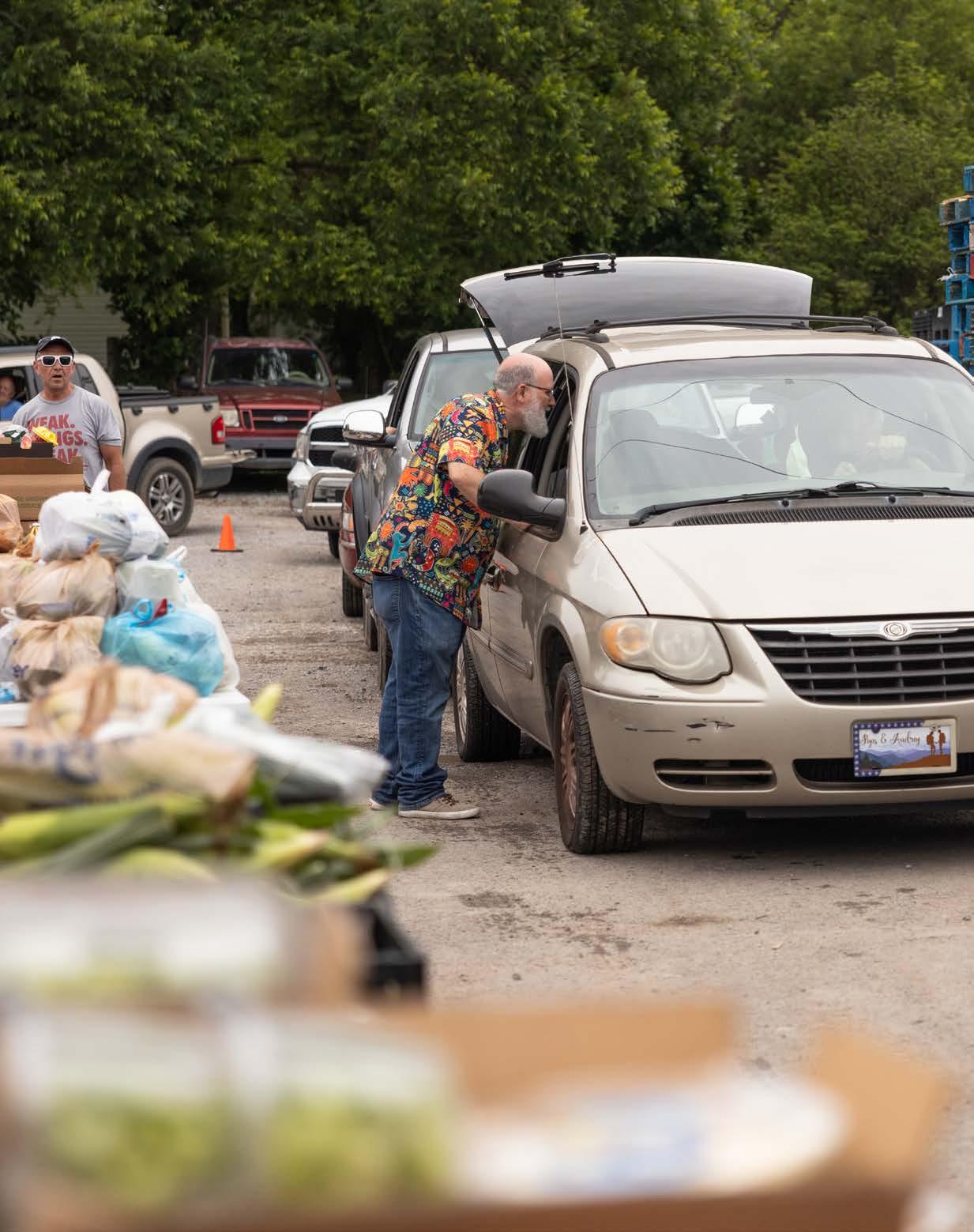
WGU’s School of Technology allows students to pursue top IT certifications while they complete their IT degree.
For many IT professionals, industry certifications often compete with a degree when it comes to cost, a student’s time, and career prospects. At the WGU School of Technology (WST), there is no competition. WST courses are designed so that students earn valuable IT certifications while completing their bachelor’s or master’s degree—all for no extra cost to the student.
Like all the schools at WGU, WST is accredited, online, and competency-based. This means that students can move through as many courses as they can manage in a six-month term for the same flat-rate tuition. At the same time, WST stands out for including industry certifications such as Cisco, CompTIA, ISACA, ISC2, and AWS in its degree programs.
With over 60,000 active IT students, it’s no wonder WST is the largest conferrer of IT degrees in the country.
A vital component of WST’s success is the involvement of advisory boards made up of industry experts and community leaders. WST partners with seasoned organizations like Cisco and T-Mobile to inform its curriculum. These partners provide critical feedback and insights into the latest issues that tech employers face. By ensuring curriculum remains aligned with real-world needs, WST makes sure its graduates are equipped with the skills that employers value most.
WGU also embeds hands-on activities like labs into its programs so students demonstrate their skills and expertise before they even graduate. In fields where hands-on experience and certifications can rival traditional degrees in employability, this integration gives WST graduates a significant advantage in the job market by bolstering their résumés and enhancing career prospects.
WST is also committed to enhancing the career prospects of those who are not traditionally represented in the tech industry. Black, Latina, and Native American women are the most underrepresented population, making up only 4.7% of the computing workforce, compared to 16.7% in the overall U.S. working population. This matters because diverse companies tend to outperform others and be more innovative.
Through its various programs such as WGU Academy, Women in Tech student and alumni clubs, female program mentor matchups, and leadership webinar series, WST strongly supports historically underserved populations such as rural, first generation, low-income earners, and people of color. All students are guided by dedicated, diverse and experienced faculty that is majority female and more than one-third people of color.
WST’s inclusivity and innovation is exemplified in its data analytics program, which supports 43% female students in its bachelor’s program and 35% in its master’s program. Data analytics is the creative use of data and statistical modeling to tell a compelling story. The M.S. in Data Analytics program has a Decision Process Engineering specialization that is the first of its kind to incorporate programming, math, and business into one core curriculum.
Nearly 44,000 graduates, awarded more than 48,000 degrees
BACHELOR’S PROGRAMS
Cloud Computing
Computer Science
Cybersecurity and Information Assurance
Data Analytics
Information Technology
Network Engineering and Security
Software Engineering
Accelerated Information Technology Bachelor's and Master's Degrees
MASTER’S PROGRAMS
Cybersecurity and Information Assurance
Data Analytics
Information Technology
Management
Computer Science
Software Engineering
CERTIFICATE PROGRAMS
Full Stack Engineering
Front End Web Developer with CodeSignal
Java Developer with CodeSignal
ServiceNow Application
Developer
Data Analytics Skills
Artificial Intelligence (Single Course)
As tech professionals consider the short- and long-term value of a degree, they can count on WST to deliver both.
WST equips students with sought-after skills, industry-recognized certifications, and a pathway to excel in the rapidly evolving tech industry. It’s the kind of education that not only drives strategic action, but also results in lasting business value in the tech sector.
Learn more about the WGU School of Technology at wgu.edu/technology.
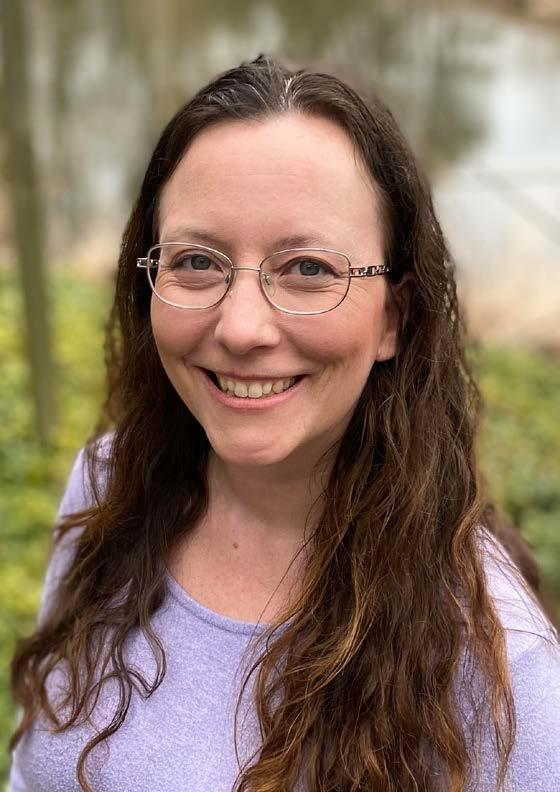
“Attending WGU to earn my BS in Cybersecurity and Information Assurance was life-changing for me as a mom of five. The flexibility of their online program allowed me to balance my studies with family commitments. The competency-based model allowed me to accelerate my learning while developing the expertise I needed to re-enter the workforce after 18 years as a stay at home mom. WGU’s approach not only fit into my busy life but also empowered me to achieve my career goals on my own terms.”
Jillene VanNostrand, Hampton, VA
B.S. Cybersecurity and Information Assurance
MBA IT Management
WGU’s School of Technology is dedicated to preparing students for both current and future challenges in the digital world.
Cybersecurity is an ever-growing field in today’s digital landscape. Its experts protect systems, networks, and programs from attackers to keep digital assets safe; but professionals are in short supply. According to the Lightcast Cybersecurity Talent 2024 Report, over 265,000 cybersecurity workers are needed to protect the nation from cyberattacks. Employment growth over the past decade has not kept up with the demand for trained cybersecurity workers, and the talent gap has led to industry shortages and increased risk of cyberattacks.
With the urgent need for cybersecurity specialists to protect digital infrastructure, workforce training in cybersecurity has become an utmost priority.
Because the university responds directly to workforce needs, WGU is ready for the increasing demand for cybersecurity professionals. WGU’s School of Technology (WST) has the largest cybersecurity program
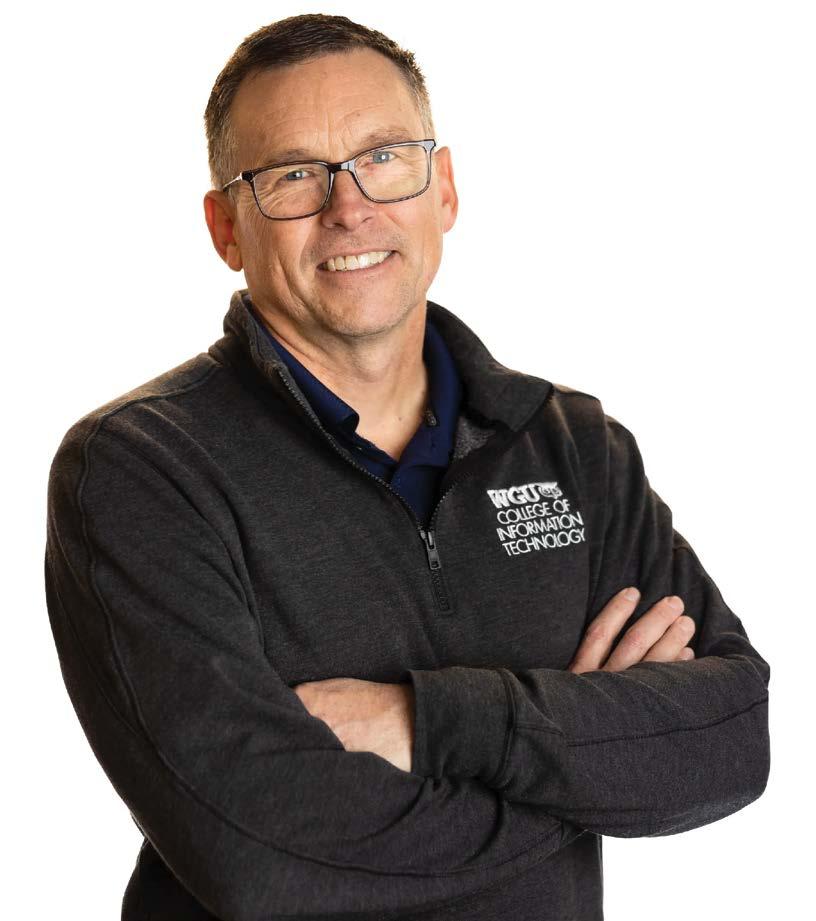
in the country, with nearly 30,000 active students and almost 14,000 conferred cybersecurity degrees.
Senior Vice President and Executive Dean Paul Bingham recently went on the Sage Advice podcast to explain how WGU remains on the cutting-edge of cybersecurity and technology education.
“In the School of Technology, we update our curriculum every 18 to 24 months,” says Bingham. "We're having to refresh some of the curriculum that's in each of our programs just because things are moving so fast in the industry." WST's systematic approach guarantees that students are equipped with the most relevant skills and knowledge for today’s job market.
WGU’s cybersecurity program includes 15 top industry certifications that are included with the cost of tuition.
Plus WST collaborates with industry experts to ensure its curriculum teaches what employers seek. These certifications and partnerships open doors for graduates to secure impactful careers at organizations such as Apple, Walmart, and the U.S. government.
“
"In the School of Technology, we update our curriculum every 18 to 24 months."
PAUL BINGHAM SENIOR VICE PRESIDENT + E XECUTIVE DEAN

The FBI’s Internet Criminal Complaint Center witnesses an average of 758,000 cyberattacks every year, and this number is only growing. Fortunately, the National Security Agency and Department of Homeland Security have designated WGU’s B.S. in Cybersecurity and Information Assurance as a Center of Academic Excellence in Cyber Defense, joining the top recognized cybersecurity institutions across the country.
Those who defend the nation against cyberattacks have turned to WGU, and students who are active-duty or veterans particularly benefit from WGU’s flexible model. Military-friendly programs allow students to take classes wherever they are, which is why over 35% of cybersecurity students and alumni are active-duty or veterans. In fact, of the military-affiliated students enrolled in the WST, 80% are enrolled in undergraduate cybersecurity degree programs.
Cybersecurity graduates are highly employable and sought after not only in government but also by various industries such as healthcare, banking and finance, and education.
Demand for cybersecurity professionals is growing, and WST is meeting that demand affordably and sustainably. As the largest conferrer of cybersecurity degrees in the nation, WST remains dedicated to preparing students for both current and future challenges in the digital world. By consistently updating its curriculum and embedding valuable certifications into the program, WST sets cybersecurity students up for success as soon as they graduate.
Bingham says it may start even earlier. “Students often tell us that getting these certifications helped them land jobs or promotions before they even graduated,” he says.
To learn more about how WGU is shaping the future of cybersecurity education, check out the full episode with Paul Bingham on the Sage Advice podcast.



Continuing education can be a challenge for any working parent. For those in the military, pursuing a degree requires an added level of flexibility.
Aspen De La Cruz, a full-time military professional, IT specialist, wife, and mother of three has experienced this balancing act firsthand. Like many military professionals, she did not let obstacles get in the way of her dreams. Her educational journey with WGU highlights how a flexible, competency-based learning model can transform not only her life but the lives of those she serves.
Aspen's journey was shaped by service. At 17, De La Cruz was uncertain about her future. Although she thought college might be the
next step, she didn’t want to waste money or scholarship opportunities without a clear direction.
She chose to enlist in the U.S. Army, and her ability to follow orders and anticipate needs quickly set her apart. “In the military, it’s really about whether you can both lead and be led,” De La Cruz explains. “I ended up excelling at both.” Eighteen years later, De La Cruz continues to serve in the military as a respected IT specialist.
ASPEN DE LA CRUZ “
"Because of the skills I learned at WGU, I was able to communicate like a professional."
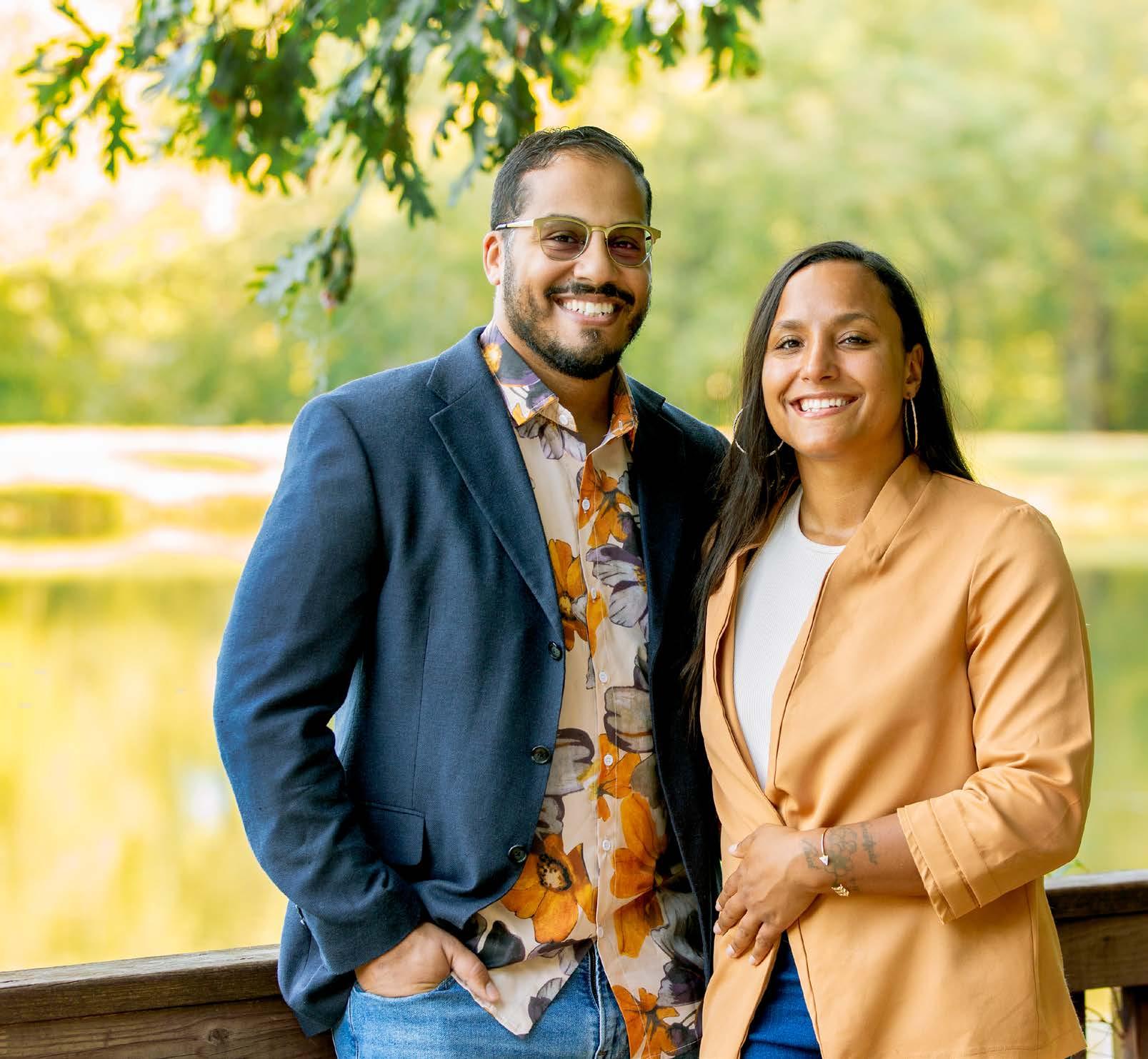
After earning an associate degree, De La Cruz decided to further her education despite her demanding military schedule. Her husband was also pursuing a degree and recommended that they return to school together. De La Cruz was seven months pregnant with their second child and had a demanding military schedule, so she and her husband chose WGU for its unparalleled flexibility and military-focused programs.
De La Cruz admits that returning to school wasn’t easy. She worked full time during the day and was soon caring for a toddler and an infant at night. That meant she did her schoolwork after the kids went to bed.
“Going from a mom of one to a mom of two meant that school was difficult,” De La Cruz reflects. “But WGU’s flexibility and my mentors definitely helped me get through it.”
WGU’s competency-based learning model allowed De La Cruz to use her military training to integrate practical experience with academic knowledge. “The ability to take corporate certifications and apply them directly to my coursework gave me a lot of confidence,” she explains.

ASPEN DE LA CRUZ “
"Going from a mom of one to a mom of two meant that school was difficult, but WGU’s flexibility and my mentors definitely helped me get through it."

School, work, and family challenges suddenly increased when De La Cruz was deployed to Iraq. “When I got the notice that I was deploying, the thought of continuing on with school was a lot for me,” she says. WGU’s mentors rallied around De La Cruz and helped her take advantage of the university’s adaptable model, recommending that she frontload less-intensive classes before deployment and then enroll in more demanding courses once she returned.
Although De La Cruz carried the anticipated stress of leaving her children and husband and the worry of deploying to a new, unknown place, WGU stood by her.
“My mentor understood everything I had on my plate, so they laid out a game plan and said, ‘This is how you’re going to be successful. We’re going to push you, but you can do this.’ They calmed me down and said school shouldn’t be one more thing I’d have to worry about.”
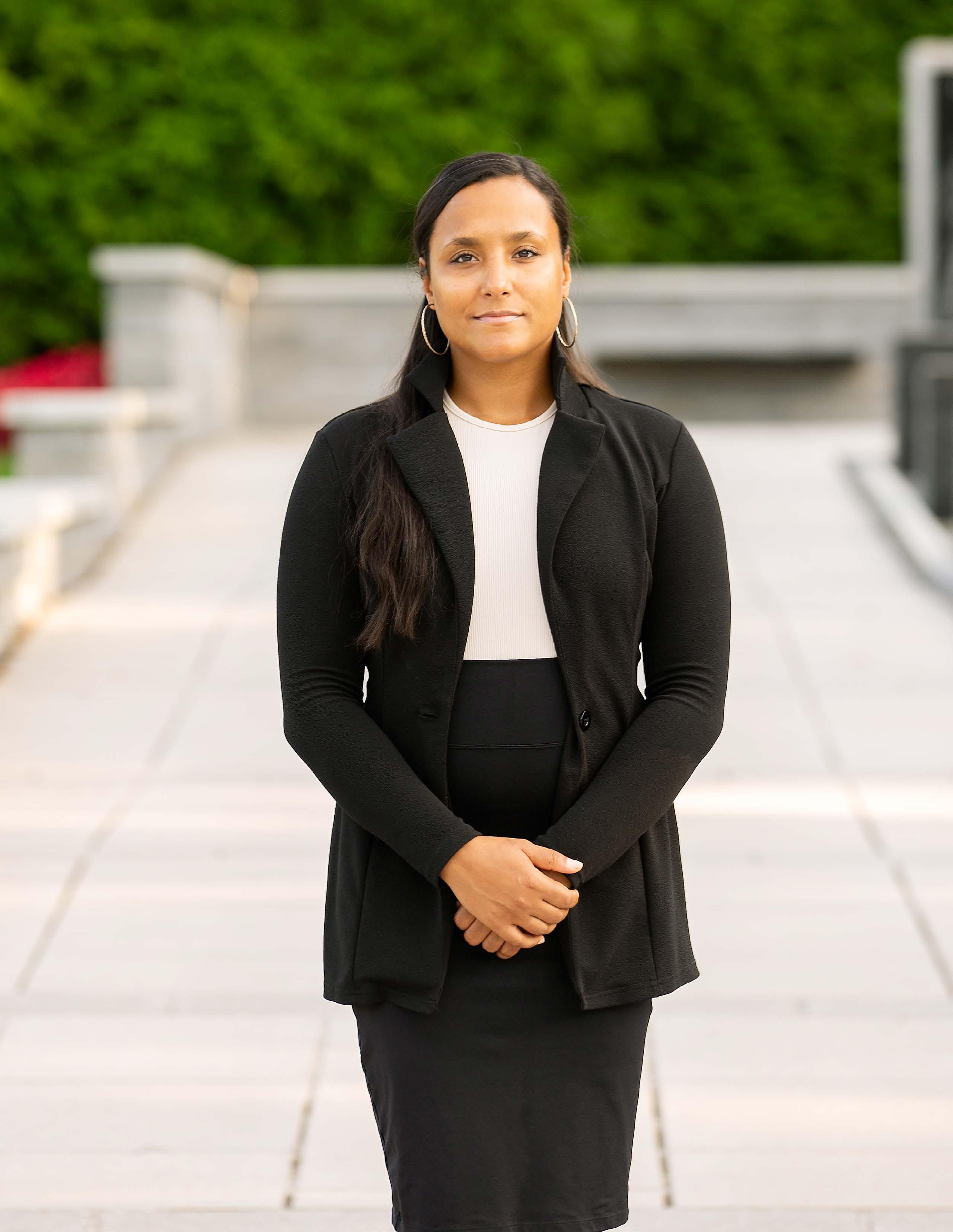

After two-and-a-half years, three children, full-time work, and an overseas deployment, De La Cruz earned her bachelor’s degree from WGU in information technology with an emphasis on security.
Her husband then proposed a new challenge: they should earn their master’s degrees from WGU together. De La Cruz took on that challenge and earned her master’s degree in information technology management in just three months.
The skills gained from her education at WGU proved invaluable. After earning her master’s degree, De La Cruz was tasked with leading a multiyear headquarters location move, which included not just the IT portion of the headquarters
but also all of its contracts and infrastructure development. She served as project manager and found herself using the skills she learned at WGU to manage the project effectively and ensure deliverables met expectations. Since graduation, she’s been eager to mentor young IT professionals and women in the field. She knows that her WGU journey has equipped her with the tools to inspire and guide the next generation of IT leaders.
For those considering higher education while on active duty, De La Cruz offers valuable advice. “Those who are enlisted now need an education if they really want to succeed in their career. Having a school that can support us and
remain flexible when we need it, and also provide a no-nonsense education, is key.”
WGU remains committed to service members by offering military-focused education for those on active-duty, veterans, and their families. With a military support department, personalized mentors, and military-specific scholarships, WGU continues to honor and uplift service members and their families as they pursue higher education.
For anyone wondering if they have the time, ability, and drive to earn their bachelor’s or master’s degrees, De La Cruz says, “WGU is really great at getting to the point and ensuring you don’t waste your time. I’d say, a hundred percent, just go for it.”
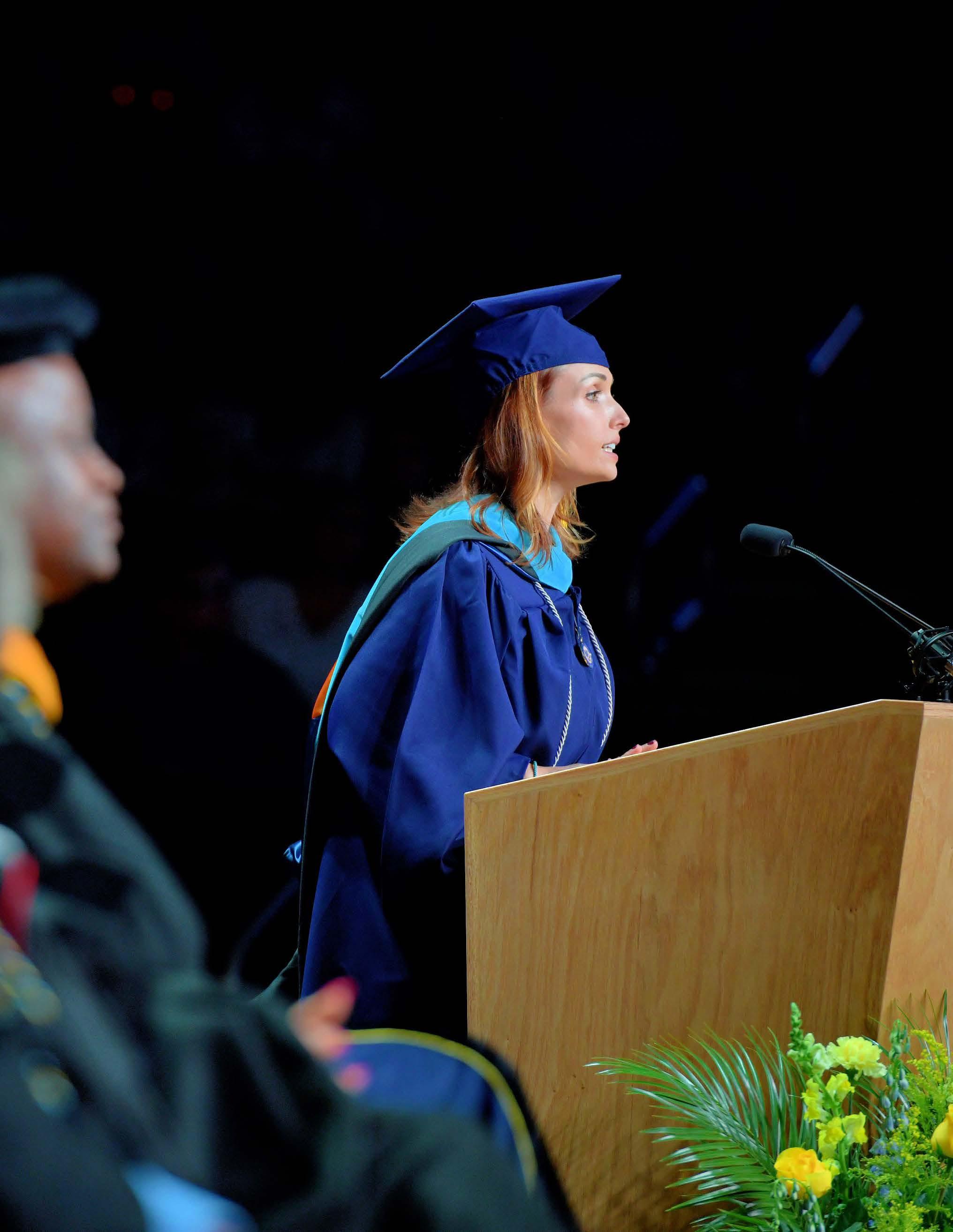

WGU was founded by governors to help solve unmet workforce needs in high-demand career fields like nursing, teaching, and IT. Today, WGU is a key solution to states’ efforts to meet all learners where they are and provide flexible, competency-based education programs that meet the needs of employers while contributing to stronger communities and a healthier economy.
183,104


400,044

355,911
Graduates

$17,388
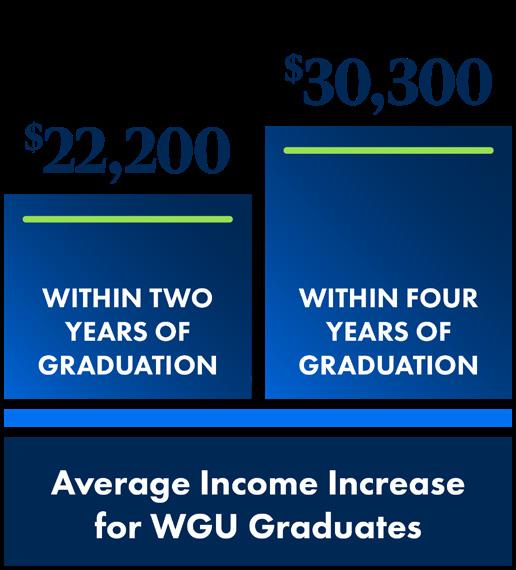
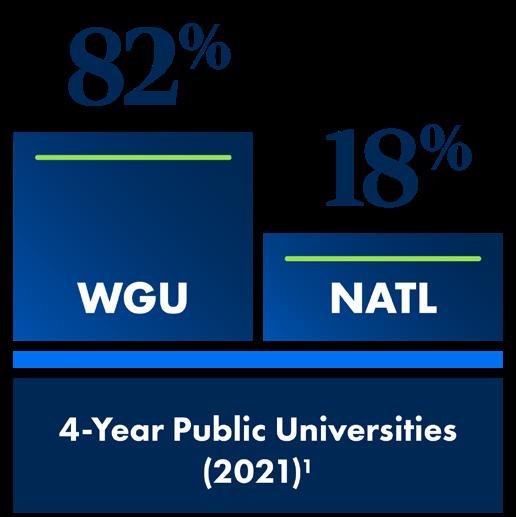
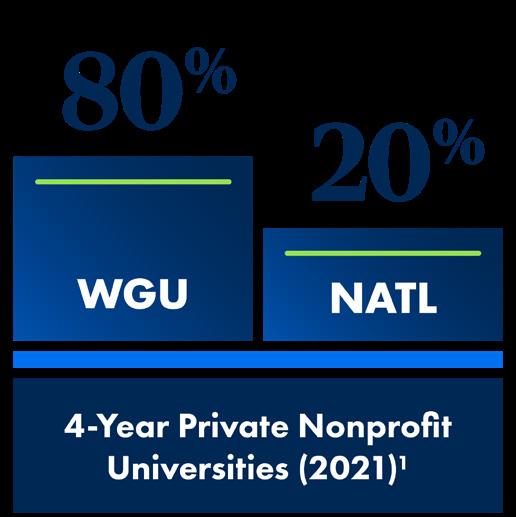

$826,000
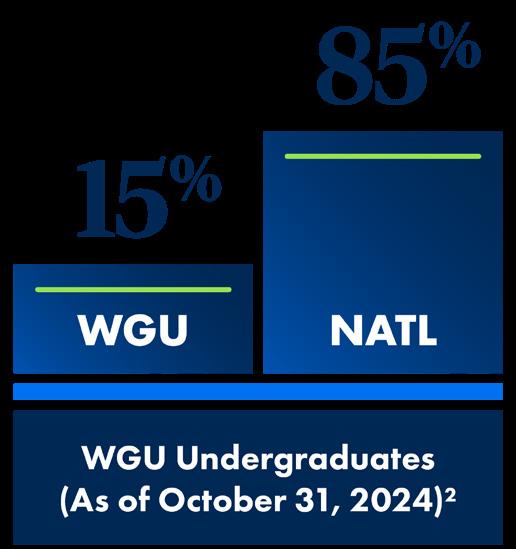
affordable, and accountable. Learn more about our
priorities and vision for the future of education at wgu.edu/impact.
Utah and WGU at a Glance
414,987


$2,245,144 $8,010

Average annual cost in 2023 for WGU undergraduate programs, compared to a national average of $12,6602
1The National Student Clearinghouse Research Center, 2Integrated Postsecondary Education Data System (2022)
Articulations in Utah
Davis Technical College, Salt Lake Community College, Snow College
WGU School Enrollment
1,057
Utah residents with some college but no credential as of July 31, 20211 enrolled in the Leavitt School of
2,517
2,144
Amount of WGU scholarship funding awarded to Utah students in 2023
3,677